#and so when you have that as the basis for her entire audience and then you promote a sleep supplement
Text
maaaan it's a weird vibe when a youtuber with the conceit that they're a licensed clinical therapist actively talks about how they don't accept sponsorships they don't put their full backing behind, and then that same youtuber accepts a supplement sponsorship repackaged as "bedtime hot chocolate"
#kat chats#sorry to randomly bring this here lol this feels more like a tweet but#idk i didn't want to try to chop it down#idk idk maybe i'm being ~sensitive~ most youtubers accept sponsorships from shitty companies#but i take issue with this one in particular bc this person is SO anti wellness machine#and anti capitalist and anti bunk science and stuff#and so when you have that as the basis for her entire audience and then you promote a sleep supplement#even if You Are only talking about the personal effects you had when you took it#the supplement itself is masquerading as a science backed and clinically trialed product#and i am sure there was a trial and i am sure it was clinical but there's no insight into that trial's methodology#if there was a control group#if variables were involved#AND it's not certified by the FDA which granted no supplement is#and the FDA has its own issues#but idk if this study is even peer reviewed#and so basically all that is to say it frustrates me because this person's audience is here BC they believe in her credentials#and to advertise this supplement to them lends credibility to a company that is SPECIFICALLY trying to masquerade as scientific#when its trials methodologies are hidden and therefore not repeatable#maybe i shouldn't care so much#but it Bothers Me
10 notes
·
View notes
Text
“Marius and David not welcome” is sort of funny to me in the grand scheme of this series, like I get the basis of this argument is “well they’re both creeps” but to that point I’d recommend a reevaluation of the entire series, particularly its cast of characters.

They are all guilty of some manner of abuse. They all commit horrific atrocities. And they moralize over these atrocities. Like. That is the principle upon which the entire series is built. Can these literal monsters ever be redeemed?
When you read Interview with the Vampire did you feel some extreme discomfort with the father/lover dynamic between Louis and Claudia? (which was excised from the show I might add) That locked-door uneasiness is the essence of southern/gothic fiction. Read V.C. Andrews. Read Shirley Jackson. Read William Faulkner. The taboos, the ick if you will, is the foundation of gothic horror. You are meant to feel this. It is an essential function of the genre.
Like- every one of Anne’s books that followed IwtV had to essentially compete with the gothic genius that is the invention of Claudia and the sickness that is her story. It’s not all effective, but it’s there in almost every work. TVL has Lestat and Gabrielle’s incestuous relationship, QotD has Armand’s abuse (yes, abuse) of Daniel. For god’s sake, TTotBT features Lestat committing a rape, and I know that you all know this. Yet no matter how you try to headcanon that scene away, it will always be significant because its very function is to service the larger themes of bodily autonomy and consent within that specific novel.
Killing in fiction is benign. We are desensitized to it. And we know this. Killing means nothing, so the narrative must work harder to find a violence that can demonstrate evil to a desensitized audience. There is a reason that these books are shelved in fiction as opposed to genre. By design, their difficulty is inherently literary. You’re uncomfortable? Good. Then Anne achieved her goal.
But if you’re looking to proselytize and transform the work into something with a black and white morality system then you have come to the wrong series. You are gatekeeping yourself from a nuanced understanding of the material. David and Marius are as bad as everyone else. The main trio are not exempt from this reading. That was the point. They are all bad. They are all complex. It is meant to be difficult to parse. Engage with it or don’t, but you are deluding yourself if you think that these two main characters are somehow going to vanish from the tv show.
(And again, AMC is going to strip away the most challenging character traits anyway)
#interview with the vampire#iwtv#anne rice#lestat#amc iwtv#vampire chronicles#amc interview with the vampire#the vampire chronicles#tvc#armand#louis de pointe du lac#marius de romanus#david talbot
476 notes
·
View notes
Text
Mike thought Will liked Angela (and he was not happy about it)
I think a lot of us already agree on this, but I wanted to talk about how it was definitely intentional. The basis for this theory is the fact that we are shown Mike remembers multiple things from El’s letter. Why would they have him recall a bunch of information but not this specific, intriguing detail about Will liking a girl? Answer: he clearly does remember, and his behaviour in the airport (and after) is supposed to demonstrate this. (Btw I don’t believe Mike 100% understands his feelings for Will, I’m on the fence about how aware I think he is).
The audience is shown that…
Mike knows about Joyce’s new job (he was frustrated by it)
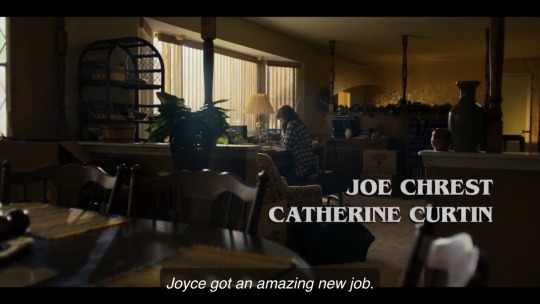

And about El missing the flowers (so he brings her some)


And about El’s ‘friends’
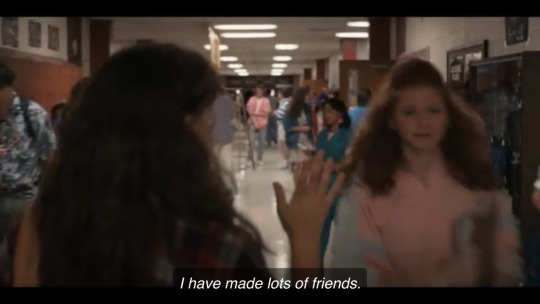
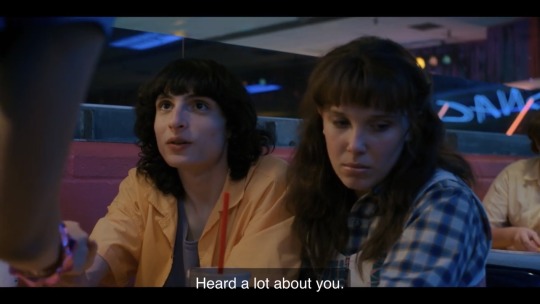
So why not Will’s ‘for a girl’ painting?
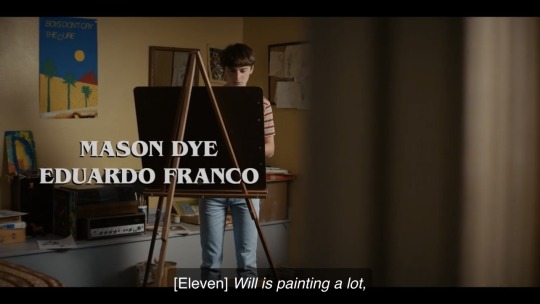
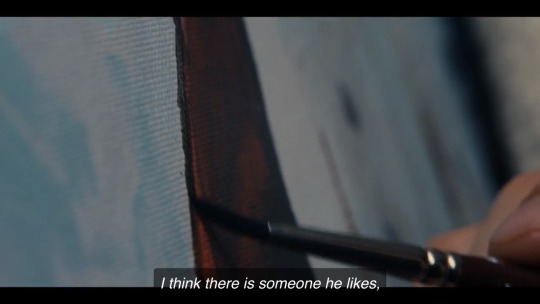
(Here’s a refresher of this painfully awkward interaction)
Mike enjoys Will’s art. This is canon. He has a book full of it, it’s all over his walls. Yet, after he asks about the painting-looking thing in Will’s hand, Mike awkwardly shuts down the conversation like he has no further interest whatsoever, like he wasn’t the one who brought it up. It’s the definition of pretending not to care. Why would they have Mike behave like this unless to show the topic was aggravating him on some level?
Also, hearing that your best friend likes someone is kind of a big deal. It’s something you are very likely to question and tease them about. But Mike doesn’t say anything. He’s with Will the entire season, yet he never once brings it up. That is the most incriminating part. Why would he not mention it unless he felt weird/uncomfortable for some reason?
Obviously Mike believes the painting is for a girl Will likes. Jealousy ensues (but again I don’t think Mike fully understands what he’s feeling). Now the Angela specific part. Mike gives Will this faltering look when he says Angela’s name:
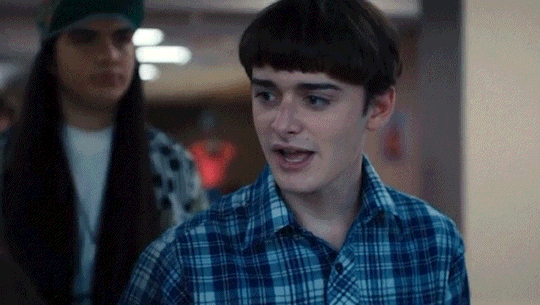
Then when Angela approaches them at Rinkomania, we get this blink-and-you-miss-it glance from Mike to Will after El introduces her:
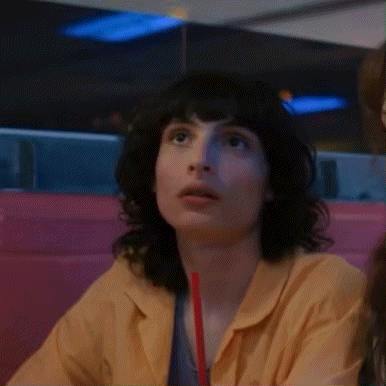
I’ve seen people say Mike was looking at Angela’s friends here, but I don’t think I agree. Plus from the perspective of this theory it just makes logical sense he would check Will’s reaction to the girl he presumably likes. Also he sneaky glanced at Will multiple times in the airport (see this post), so I don’t think it’s far fetched they’d have him do it again here.
I think this is how it happens: Mike suspects the rolled up thing at the airport is a painting (educated guess). He asks Will ‘what’s that?’ in such an abrupt, random way that it seemed as though he was desperate to know but trying to act casual. Then Will confirms his painting suspicions, and (courtesy of the letter) Mike assumes it’s for a girl Will likes, which is why Mike shuts down the conversation so fast. He doesn’t ask any more questions because he thinks he’s already got the answers. Then hearing Will repeat only Angela’s name back to El must’ve sent alarm bells off in his mind, and at Rinkomania he’s like so this is The Girl huh? (Obviously after the skate incident he finds out he was wrong lol).
This whole thing is a very subtle element of the storyline, but it’s undeniably there. I know there’s a general agreement on this idea already but I like looking at the details :)
480 notes
·
View notes
Text

Shakespeare & Eugenics in Space
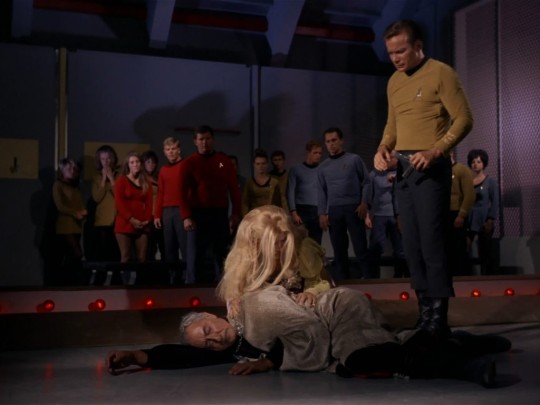
Pro
Kirk backstory, and Kirks way of dealing with his trauma (immediate denial in front of others and putting up a wall, then researching and dealing in private – and later on with Spock and McCoy). Opposed to how both Riley and Leighton react
Kirk seducing a woman not for pleasure but for a secret cause / using his charm and sexuality to manipulate someone.
Unlike in the other cases of this happening he's the one being played by Lenore who is pretending to fall for him to murder him, which is a twist great
Spock immediately noticing something is up with Kirk
Spock then going to McCoy for help and support, twice! Great further development of all sides of the trio in this episode
McCoy's beautiful eyeliner is giving me happy chemicals
So many Spock and McCoy interactions
“And Please, Mr. Spock, if you won't join me, don't disapprove of me”is a line straight from fanficition
Spock correctly predicting how Riley will feel about being demoted for no reason - trying to look out for the crew and always questioning Kirk
Uhura playing for Riley who is lonely → further crew dynamics
The entire confrontation scene between Kirk, Spock and McCoy is great – it starts on a professional basis, Kirk being angry and defensive, and even though McCoy doesn't share Spock's suspicions to that degree he backs him up. Spock then turning the conversation on a personal level – it's not just about ships business, it's about Kirk possibly dying. Kirk then relenting and talking with his two friends about his feelings and the situation. Spock being Kirk's logic and information and McCoy ethics and morals
Great character work for Kirk who is aware of his responsibility, the small line separating vengeance and justice and his own morals
Kirk trying to wait to confirm his suspicions but then throwing caution to the wind and approaching Kodos when he realizes it's not just his life on the line after the murder attempt that would've cost many lives
Lenore rightly calling out Kirk at the end for using people as tools
The Kirk / Kodos confrontation is one of the best character scenes in TOS. The acting is perfect, the dialogue and emotion heavy and direct. The conflicting emotions of a mass murderer and Kirk having to deal with the emotions of confronting the man who directly traumatized him.
Kirk being able to talk down Riley with words instead of force
Kodos realizing what is daughter did making his character even better
set and costume design , fitting music
the whole play within the show thing with its stage & acting
the way the audience gets Kirk's backstory over the course of the episode along with Spock and can gather further understanding of Kirks reactions
the plot mirroring a classic Shakespeare play itself
differs from the other episodes in a nice way- very human and story driven; also murder mystery vibes and film techniques
the tension still holds up despite no real action scenes – first though the mystery of how this man is connected to Kirks past, then the ongoing mystery as well as the threat to Kirks life
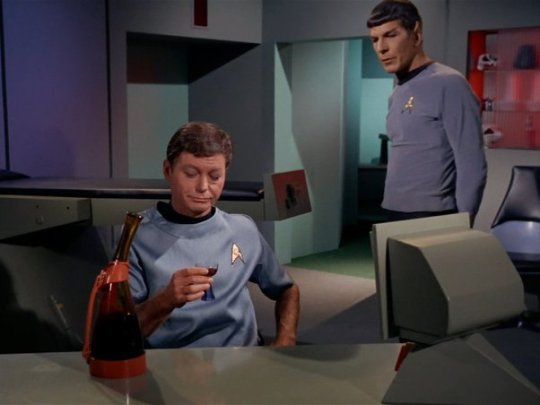
Con
McCoy being careless about Riley overhearing him
Although I did like her acting, I think they should've commited to making her insane persona come out gradually / less extreme before the death of her father or play it straight and have her go insane after the death; this felt a bit rushed / sudden
Counter: Kirk fake womanizer
Quote
"Captain Kirk, who are you to say no harm was done?" - Lenore "Who do i have to be?" - Kirk
"What if you decide that he is Kodos? What then? Do you play God, carry his head through the corridors in triumph? That won't bring back the dead, Jim" - McCoy "No. But they may rest easier" - Kirk
Moment: Confrontation Kirk and Kodos - tense, well written and played
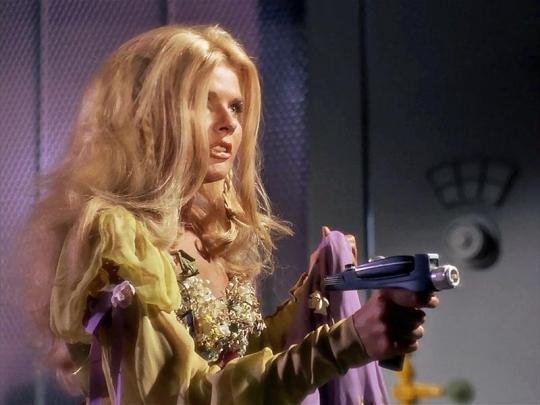
Summary: Underrated episode that even though it lacks classical sci-fi elements and action scenes introduces important backstory information for Kirk and gives further insight into his character and morals as well as his relationships with Spock and McCoy while also giving further development between those two. The acting is brilliant, especially Shatner and Arnold Moss, and the tension of the story holds up from the beginning until the end.
Previous Episode - Next Episode - All TOS Reviews
#Star Trek#star trek tos#the conscience of the king#star trek the original series#wewatchtos#wewatchstartrek
45 notes
·
View notes
Text
IchiRuki is not "delusional," and saying that it is means you have no media literacy
IHs seem to think that all it takes to interpret Ichigo, Rukia, and Orihime's feelings is to read the epilogue. To a literary critic, that is absurd. Characters explain how they feel over and over again across a piece of media. An ending may give us context that alters the earlier scenes, but this is always in very specific ways. With Bleach, nothing about the epilogue indicates that Ichigo and Rukia are not supposed to be read as at least potentially romantic.
For posterity's sake, I should point out that I've only seen the first few arcs of the anime, so most of what I say below is based on the manga. That said, the anime is part of the story as much as the manga is, so just because something happened in the manga and not the anime, or vice versa, doesn't make it "truer" to the text, just true to different texts.
Let's start with the fact that the story repeatedly suggests that Ichigo and Rukia have a romantic vibe to them. The rumors at school make this explicit, but just from the setup of two classmates who clearly have a secret that are constantly sneaking off, especially when you add in that they go home together and sleep in the same room. I know a lot of people want IchiRuki to be the Platonic Boy/Girl Friends (TM) but honey, they just ain't them. You're thinking of Naruto and Sakura. Claims that they have a sibling vibe are utterly baseless, especially in Bleach, where sibling relationships are a very explicit theme. Not every non-romantic couple that's nominally the same age (don't get me started on the "she's 150" arguments; go prosecute ACTUAL 150-year-olds dating 15-year-olds and leave me alone) is automatically a sibling vibe. The most I could say is that they do bicker a lot, but we all know that's just as comparable to a married couple. Saying Rukia is a mentor to Ichigo admittedly has a little more basis, especially when Bleach doesn't have a designated mentor figure. I still think Rukia's role in teaching Ichigo about the Soul Society is more of a guide archetype, though; think less Genkai, more Botan.
But setting aside the setup, the Soul Society Arc, or Rescue Rukia arc, is loaded with romantic themes and imagery. Don't get me wrong; nothing says that Kubo couldn't have introduced these as a fake-out to the audience, with the intention of subverting their expectations. I don't personally think there's anything that really suggests that, at least not so far as the romantic reading of the Soul Society arc itself being entirely off-base. The whole arc kicks off because Rukia is asked by Orihime and her friends if she "like-likes" Ichigo. She says she only likes him as a friend, but all of the narrative cues suggest that she's being dishonest, from the narration to the fact that she was so bothered by the question that she chooses now to go to the Soul Society and face her punishment. The suggestion at this point seems to be that Rukia having any type of affection for Ichigo, be it friendship or romantic, is inappropriate or even impossible for a shinigami. Ichigo's feelings are treated similarly, as he never gives a straight answer when he's asked why he wants to save Rukia, but several characters suggest that it's because he's in love with her. This doesn't mean he is, but the narrative does not deny that that is a possible reasoning. We're not even really told what his answer is; the scene where he thinks, "That's why I fought so hard to save you" seems to be suggesting that he wanted her to be able to decide whether she would live in the World of the Living or the Soul Society -- or else it's saying he didn't want the last time he saw her to be her telling him she would never forgive him, or it's saying that he wanted to see her smile again. Like I said, we're not given an explicit answer to this question.
The rest of the manga is basically about Ichigo adjusting to life without Rukia. I think it's fair to say that even if you read Soul Society romantically, from the Arrancar Invasion Arc on, Rukia is no longer written as Ichigo's love interest. This doesn't invalidate anything suggested in the previous arcs, though. If anything, I would argue that Ichigo's feelings become pretty explicit by the time we get to Hueco Mundo. The dramatic reveal of Rukia coming to visit, and the fact that she's the only person capable of breaking him out of his funk, both have a romantic reading to them. When the team arrives in Hueco Mundo, Ichigo is shown to be overly concerned with Rukia's safety, explicitly singling her out aside from Renji, Uryu, and Chad. (I guess that could just be misogyny, though.) Even Ichigo's obsession with getting a rematch with Grimmjow could be traced to him nearly one-shotting Rukia during their fight in Karakura. I'm not saying any of these are exclusive interpretations, just showing how it's regularly reinforced that Ichigo feels differently about Rukia than any of his other companions, even to the point of letting it cloud his judgment.
I don't think I need to say anything about Ichigo and Rukia's goodbye before the timeskip. The way the scene is drawn, and written, and framed by the narrative, is very reminiscent of romance scenes, to the point that if it was meant to be read as exclusively platonic, it comes off as a very bad satire. And jumping to the anime real quick, I know episode 342 is anime-only, but by no means do I think that invalidates everything it says about Ichigo and Rukia's feelings for each other. That episode oozes with ship-bait, to the point of turning the subtext of their relationship into text. And if you think this is something that the anime studio injected into the narrative -- well, first of all, then we'd also have to parse out everything that the Shonen Jump editors injected into the manga -- but Kubo himself has said that he thought the episode was a welcome addition. So, if your'e someone who thinks the author's vision is the final say on the manga, there you have it; Kubo basically canonized ep. 342.
With all that in mind, I think that, at the very least, Bleach's narrative suggests that Ichigo and Rukia are coulda-beens. Maybe Ichigo was more invested than Rukia was, maybe Rukia deemed it inappropriate due to them being from different worlds, but in the language of manga and storytelling in general, the idea that they might have feelings for each other isn't some fan's "delusion"; it is actually part of the text. Whether or not they actually felt something for each other is for them and them alone to know, but the story tells us that these are two people who met, came to care very deeply for each other, and then drifted apart without ever taking the plunge.
The question that this leaves us with is, where does that leave Orihime?
If there's one character whose feelings are never up for debate, it's Orihime. We know from practically her first scene that she has a crush on Ichigo. Now, at first that's never taken seriously. It's mostly just a setup for the running gag of her bonkers imagination. Over time, though, we get a little bit more insight into Orihime's feelings, and she starts to get taken more seriously as a character. There's a version of Bleach where, as Orihime steps up to be by Ichigo's side in the latter arcs, he moves on from his feelings for Rukia and the two develop as a couple. If that were the case, even if IchiHime doesn't appeal to me, personally, I would still accept it. It would actually be a refreshingly mature take on teenage romance. Unfortunately, that version is not in the text.
For that reading of Bleach to work, we would need to see their love for each other build to a place where both characters bring out the best in each other, at least comparably to Ichigo and Rukia. Unfortunately, Ichigo and Orihime don't seem to bring out the best in each other. Ichigo brings out all of Orihime's insecurities. During the lead-up to the Arrancar arc, Orihime starts to compare herself to Rukia. (There's literally a panel sequence that says, without a single word "find you someone who looks at you the way Ichigo looks at Rukia", to anyone who's still unconvinced that there's a romantic reading to those two.) And as the entirety of the Hueco Mundo hammers home, Orihime is personally ill-equipped to be Rukia. Both Rangiku and Rukia herself have speeches where they tell Orihime that she needs to stop trying to live up to what she thinks Ichigo wants and just be herself, but she sticks to the mantra that she wants to "fight by Ichigo's side" -- you know, like Rukia does. Urahara even tells her outright that she needs to stop trying to put herself on the battlefield. It's not particularly nice of him to squash her dreams like that, but it's not as though she doesn't get an out; Hachi is already there, trying to teach Orihime to be a healer, something she has a natural talent for.
Instead of reframing her wishes with the advice of her friends, Orihime makes the worst decision of her life and goes to Hueco Mundo with Ulquiorra. Now, obviously this is coerced by the Espada and not her actual response to the situation, but that doesn't mean they're not framed as consequential to each other, narratively. Orihime is told she has a flaw that she needs to change, but before she's able to do so, she must go through hardships so she can let go of the façade that she's using to cover up her flaw. Well, she goes through hardships alright. She's imprisoned, assaulted, and threatened with death. Orihime is confronted both with her weaknesses, and with her strengths, as she is eventually able to appeal to Ulquiorra's humanity through her willingness to see the goodness in people, even those who are actively abusing her. You would think this would lead to a change in Orihime that goes back and answers the underlying question, but it doesn't. By the end of the manga, she is still fantasizing about being a Battle Couple alongside Ichigo, and she's still not good at it. I don't know how many times I've had to say this, but Orihime and Ichigo losing their fight to Yhwach is not a triumphant moment. The fact that it's the result of Orihime achieving her series-long dream is more of an indictment against their relationship than anything else I could say.
To adopt the narrative that Ichigo got over Rukia to be with Orihime, we would also need to see him come to appreciate Orihime in her own right, something that he is...hopelessly uninterested in. No, we can't just take for granted that he's a dopey shonen hero and "that's just his character"; if he's supposed to be . We also absolutely cannot take for granted that this happens offscreen; that can be a headcanon that you, as the audience, choose to adopt, but it's not suggested by anything other than the assumption that the ending is supposed to be, and can only be, saccharinely happy. There's nothing to suggest that Ichigo changes the way he thinks about Orihime in the text, and we only ever see him thinking about her is when reacting to her in scenes, and just generally not wanting her to die. The closest we get to him expressing a romantic interest in Orihime is the scene where he asks her to "wait for him" -- at Rukia's wedding, no less. I shouldn't have to spell out how having this happen on the very day, at the very moment, that Rukia is considered "off-limits" to conventional societal standards undercuts the idea that Ichigo is not taking Orihime as a consolation prize. Which, don't get me wrong, SUCKS. But it is implicit in the framing, and can't be ignored.
And that's without getting into Rukia's relationship with Renji. I think in this case, we can very obviously see that Kubo tried to write a romance between them, but he did so in such a half-assed way that I find it very hard to take seriously. Yes, Ichigo throwing Rukia to Renji is obviously meant to tell us that Renji is her love interest from that point in the story, but that doesn't mean it works. First of all, we can't pretend Renji wasn't awful to Rukia for a majority of the Soul Society arc. Sure, this is him pre-character development, but it's a huge leap to go from "I'm conflicted over whether I should tell off my boss for killing you" to a canon couple. But even with Renji beating up Rukia and telling her he wished she was dead, you can still get to the point where they repair their relationship -- it just takes a lot of work that Bleach simply doesn't do. We need more than Renji promising to turn things around, we need to see him do things that make up for that. To be fair, though, Kubo spends very little time showing us what they're like when one of them isn't on death row. At most, they seem to train together a lot. Like, you want platonic boy/girl besties? THESE are platonic boy/girl besties. Actually, they're the ones with the sibling dynamic, given that they literally grew up calling each other family.
So where does that leave us? Some people seem to assume that despite Kubo fumbling the ball, the canon couples were meant to be, and that they somehow found happiness despite all the evidence to the contrary. Again, you can hold that headcanon for yourself if it makes you happy. However, if we're going strictly based off the text, the answer seems to be that Bleach doesn't have a happy ending. The characters whose endings are not related to getting married off all end up doing the one thing they didn't want to do -- Chad ends up using his fists for personal gain as a boxer, Uryu ends up alone, etc. -- and the ones who DO get what they want are the ones whose dreams are framed as being misguided, in Orihime's case, or unearned, in Renji's case. I'm not saying you have to ship IchiRuki, of course. I can't tell you how to read the series. At the end of the day, Bleach is to you what it is to you. But saying that reading IchiRuki as romantic is "delusional" is more than just false, it diminishes media literacy for all of us.
#bleach#rant#shipping#ichiruki#ichihime#ichigo kurosaki#rukia kuchiki#orihime inoue#renji abarai#we do knot always love you#i mean look at that title#that's supposed to be the big renruki book#why is it based around a double entendre that's basically#we always love you -- NOT!
87 notes
·
View notes
Text
The Sandman female characters - why are they buried?
I'm gonna make a series of my thoughts on the female Sandman characters, both critiques of how they're treated and appreciation posts for them. (These are just my opinions, everyone is entitled to their own) Hope you enjoy!
Also tagging @thesandwomen because I'm also very curious to hear your takes on her.
Part 1: Rose Walker
As a character, she gets an obscene amount of hate. Even her actress was bullied terribly when the show came out (which is a whole other issue).
The thing with Rose Walker is that she's strong, complex, powerful, but not in necessarily always visible ways.
She's making her own way in life, traumatized but loving, ambitious and creative. Her inner dialogue and workings is complex and tragic but not in always... I guess cinematic or traditional ways.
She shows the realistic side of someone, specifically someone growing up through tragedy.
She's endlessly creative but she's cursed as this Vortex which destroys and she can't escape that, unless she dies. While she's going through all this she's dragged for not being more dynamic or charismatic.
I found Rose Walkers character to be awfully realistic, because in my eyes, a way of interpreting her story is that one of a young woman, growing up, promising and creative, has been pushed down by society and other people's actions against her. She's creative, loving, ambitious, searching for her brother and making a life for herself. But then she's pulled down into this Vortex, this series of awful and inexplicable events where things are happening around her, she knows she's causing it, and she can't stop it, and the only way to solve it is to die and leave a life she has fought for so hard.
Strange people are telling her what to do, she doesn't understand it entirely, but she does it to the best of her ability. She pushes back at them (Dream and the Corinthian) at times, because what else can she do?
In the end, she ends up with one of her last living relatives dying in front of her and realizing there was no other way for it to turn out. And she's hated, because throughout these events, she isn't entertaining enough.
I'm not someone best suited to talk on the racism that undoubtedly impacted how the fandom impacted the character, but it's worth noting that racism certainly played a role.
Rose Walker shows the sides of a character, specifically a young, strong woman character that I feel like isn't often marketed.
Some of those who claim "girl power" dislike her because she isn't what they're used to seeing. I'm not claiming that she's revolutionary, I'm saying that she IS that type of character, portrayed perhaps more realistically.
She is powerful but she's not cocky and smiley and she won't punch you in the face. Female characters are only perhaps worth paying attention to if they have any qualities that are surface level beneficial or amusing to the audience.
I guess what I'm trying to say is that Rose Walker is disliked because she's realistic, she has no amusing qualities.
Female characters often have stock marketable traits, such as humour, physical strength, or maybe magical. It's almost as if they're being paraded around, but not as a celebration but as a freak show. These are fake empowerment characters, and I feel like a lot of the basis for initial main female characters in big media pieces was written like this.
Rose Walker has marketable traits, but mixed in there are the real thoughts of a young woman, panicked and trapped and loving, and deeply honest. And it's honesty people don't like.
A young woman's struggle isn't fun to watch, it's not funny, there's no action, it's realistic.
I'm not trying to call her the female character of all time, I'm just trying to articulate my thoughts.
Rose Walker can make people uncomfortable. A female character not being pushed into the box of marketable, but real.
I think it's telling that we as a fandom dismissed her because of her lack of marketable qualities, because if you look deeper into the character, there's so much more.
Anyway, I hope this didn't come off as too rant-y, and thanks for reading!
#rose walker#the sandman#the sandman female character#deserve more appreciation#there are definitely places that discuss the characters#but i think overall#they hardly exist in fandom#some great mutuals who have amazing blogs about them tho
138 notes
·
View notes
Text
Let me first say that I hold absolutely zero hate for any community, any minority, any gender. While I know it would be convenient for whoever disagrees with this post if I were a hateful, racist, homophobic asshole, that’s not the case. I also bear no ill will towards Masali Baduza. These are my opinions that no one else has to agree with.
I don’t like the Michaela/Michael change.
1: It’s a direct f-you to the book fans.
I have read only one Bridgerton book and didn’t get into the show till 2022 but I have known for a long time that Francesca and Michael are one of the most popular couples. I’ve known WHWW is tied with AOFAG for the most popular book. I know that Michael Stirling is a sacred name in this fandom. People have been waiting years to laugh at him, to be charmed by him, to swoon over him for years.
And now…he’s never going to exist.
Imagine if a queer character were made heterosexual. The community would be screaming. It’s not the gender politics influencing people’s emotions on the subject, it’s losing a character as they were written. We trust those who adapt literature to stay on the basic path of the story with the usual minor changes. Michaela having the same general vibes as Michael is not the same thing. This creative choice is relegating WHWW essentially to just general inspiration.
2: Jess Brownell comments while discussing the change were bad.
“I know for people who love the book When He Was Wicked that Michael Stirling is one of their favorite characters. I understand that people are going to have feelings about the fact that this character won’t appear exactly as they expected.”
“I would also just say that the book still stands. Michael Stirling still exists in book world.”
So…that’s it? Go read the book? That’s supposed to be enough? I’ll say it again, FANS HAVE BEEN WAITING FOR MICHAEL FOR YEARS. They deserve more than “lol sad for you. Go read the book!” As the show runner for a popular adaption, it’s a poor answer.
Jess also included comments about how she related as a queer woman to Francesca feeling different from her family in WHWW. Ok, great! By all means, write a personal queer storyline for your show. Please do not take a beloved character and erase them because you felt a certain way reading the book.
The fans are the only reason why the show is so popular. While no creative team should let the fans dictate every move they make, it’s very clear they ignored them entirely when it came to the love for Francesca’s story. Going this much against what the fans have 100% reasonably expected is a move that kills successful shows.
3: It’s poor representation.
Genderbending a role is the absolute laziest way to bring representation to a project. Rather than craft a new character, studios take pre-written material and give it to a woman, a POC, someone disabled or someone from the LGBTQ community to appease those asking for representation. In this case, the amount of changes they will have to make for Francesca’s storyline will create more work than it would have taken to just create a new character with their own story. The entire basis of Francesca’s season requires a male lead.
If you want representation, if you want the audience see themselves in the characters, WORK FOR IT. Don’t put forth the least effort possible and upcycle a pre-existing story. As a member of multiple of the aforementioned communities, I don’t want the bare minimum when it comes to feeling represented.
Not to mention that Francesca is one of the strangest choices of characters to make queer. Whether or not they tried, the Bridgerton writers created two brilliant opportunities for LGBTQ representation with Benedict and Eloise. Both have been theorized about (and Benedict was confirmed this season) for years and they could have written both/either a full queer storyline and it would have made total sense. Fans would have loved it! Francesca’s sexuality being changed from the book feels forced.
4: It cancels out the depth of John and Francesca’s relationship.
To spend a whole season building up John and Francesca’s love story only to end it with laying groundwork for another relationship is…so bad.
John spent the season putting in effort to come out of his shell for Francesca. He is the first person outside her family she’s comfortable enough to connect with. They find something in one another that cannot be duplicated. With Francesca utterly flustered by another person after JUST MARRYING John is a disservice to both of them. It takes away so much of the relationship’s meaning if Francesca now has an eye, even fleetingly, on someone else. Not to mention her face after kissing him? That is so far from book Francesca’s devotion and love for her husband. By initiating Francesca’s draw to Michaela, especially through the foreshadowing of Violet’s speech leading up to their meeting, the show has made John a present afterthought.
Let me finish with this…
It is NOT homophobic to dislike the change.
It is NOT racist to dislike the change.
It is NOT misogynistic to dislike the change.
Unless someone is spewing direct and discriminatory hate, they are simply a disappointed fan. 99% of the comments I’ve seen are people saying yes to queer storylines, yes to representation in Bridgerton itself, but begging not to dismantle another storyline to bring those things forth.
#i’m also turning off anons so if anyone sends me d*ath threats they’ll have to do so publically#bridgerton#bridgerton spoilers#francesca bridgerton#michaela stirling#michael stirling#when he was wicked
31 notes
·
View notes
Text
What the hell happened with Crow: an autopsy (Part 4)
*Deep breath* Okay, everybody. Let's do this one more time.
First off, hello, or welcome back. Let's get the introductions and disclaimers out of the way, shall we?
This is the fourth and final instalment in my very, very long-winded attempt to analyse the character writing of Crow over the course of the entirety of yugioh 5Ds. For everyone who hasn't read the previous parts of the analysis, you can find part one here, part two here, and part three here.
This post, and my analysis as a whole, is neither meant as a Crow hate post, nor as a manifesto to convince people who don't like him that they're wrong. It's as genuine an attempt to simply look at and dissect what the show gives us about him as I can make, though I admit to personal bias because I do like Crow. That said, I'm trying to stay as neutral as possible, because the aim of this entire post tetralogy is to look at the writing decisions made for this character and how they impact him—and how they possibly influenced the audience's perception of him.
My previous three posts all reference this as well, but since I still see these things parroted all across the internet to this day: Please don't read this post under the assumption that any of the 5Ds production rumours are true, especially not the ones surrounding Crow. Because, to make this as short as possible, every popular theory as to why certain characters were mishandled during the later parts of the show fails to line up with the production timeline of said show. Chiefly among those theories, the idea that Crow was meant to be a dark signer and that his popularity correlated to his cards, and the idea that Aki, specifically, had to give up her screentime for him because her VA got pregnant, which both lack any basis in reality, as you can read in the posts I linked. (One final shoutout to @mbg159 here, who compiled these incredibly comprehensive posts and can also be found here on tumblr. Huge thanks.) So if you can do me one favour, please just let the 5Ds rumours die already and read this analysis without the hope of seeing any of them confirmed. I'm so sick of these crackpot theories at this point that I can hardly find the words for it. And while we're on the topic, I also don't want to see this post used as a means to pit Aki and Crow against each other in any way—both have good reasons to be well-liked and both deserve their spot in the narrative, all right? All right.
And now, at last, let's get down to business. The last time I got on a virtual soapbox and yelled about Crow, I covered the entire WRGP, murder-duel-robot induced break included. That means that for this, final stretch, we'll be looking at everything from episode 137 onwards—the Ark Cradle arc. (A side not for dub aficionados here: Episode 136 was the last episode that got an English dub. In other words, everything I talk about here never even made it into the English version. Because 4Kids, I guess.) As we've done before, we'll take a look at what exactly Crow gets up to during the final stretch of the show (and, notably, the epilogue), then see whether any of it needed improving, and if so, how it could have been improved.
You'll find all further yelling below the readmore, and I'll leave you with the other, usual warning here, as well: This will be long. Even if the Ark Cradle arc, relative to the rest of the show, isn't, this post most certainly will be. So get some snacks and perhaps don't start reading this late at night unless you're good at knowing when to stop and reading stuff in bursts. (I'm not.)
As I concluded at the end of my last post, the WRGP ended up being a bit of a mixed bag for Crow. He's there, he duels, but at the same time, despite being positioned as an equal third of a protagonist trio, he's notably less important and arguably also weaker than Yusei and Jack. Moreover, where the plot is concerned, he sure didn't get too much to do—not to speak of the fact that the writers didn't grace him with any meaningful interactions with a certain character who'll become very relevant here.
But I'm getting ahead of myself. First, the preamble.
With the end of the Team New World duel, the final arc of the show drops the by this point unexpected arrival of the Ark Cradle right on our heads. So, what does Crow do here, at the start, other than be shocked? Well, not much. A lot of the first episode that introduces the Ark Cradle focusses more on the imminent threat said structure poses to New Domino City, and we flash back to our protagonists mostly to ascertain that things are, in fact, going to shit. Even once that focus on the city evacuating shifts again, the episode concerns itself more with Yusei than with Crow. However, meagre as it is, we do get the first interaction between Crow and Sherry during the Ark Cradle arc in this episode.
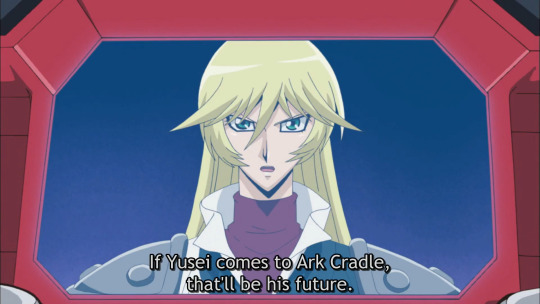
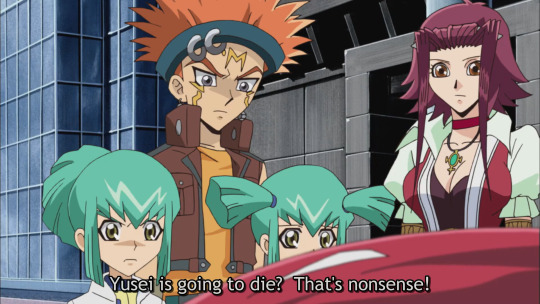
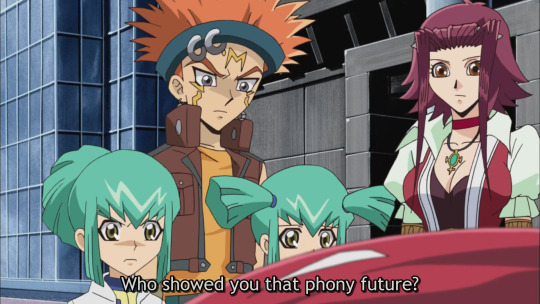
(Uh.... at least they're technically talking to each other?)
And frankly... It's not much. Unfortunately, up until the duel where he faces her, the Ark Cradle arc continues a trend regarding interactions between Crow and Sherry that we already saw in the WRGP: They barely get to interact, and even when they do, they never have anything so much as resembling a meaningful conversation, mostly because Sherry basically never addresses Crow directly, nor seems very interested in him, while Crow is usually there only to react to what she's saying, rather than actually talk to her. While digging through my mountain of screenshots, I found that latter part to be especially interesting, because as it turns out, this is a trend not just in Crow's interactions with Sherry, specifically. Many moments that probably contribute to the nefarious "screentime" (I've explained my gripes with this term in part two) some people like to accuse Crow of hogging have him only be part of a scene so he can react to what happens in it, to the point of him sometimes feeling like a stand-in for the audience reaction the writers might be hoping for. The above is a perfect example, because as far as character writing is concerned, Crow's "interaction" with Sherry here is utterly devoid of meaning. He's just there to communicate his disbelief over the ominous prediction that Yusei is guaranteed to die if he goes to the Ark Cradle, which feels like exactly the kind of reaction the writers probably wanted from the audience. After all, it's a bold, shocking statement to make. The protagonist, dying? In a card game anime geared towards twelve year-olds? It's downright preposterous. And Crow seems to agree with that, if his dialogue is anything to go by.
This one and other scenes (mostly the kind that contain plot elements that Crow doesn't actually interact with) got me thinking, though, and after having gone through so much of the show with a fine-tooth comb now, I think I've come to a conclusion, so permit me a tangent here: I believe the choice to let Crow, specifically, be a character who often only reacts to events or interactions after the DS arc, rather than contributing much himself, is deliberate. Don't get me wrong, I don't think he's the only character who is frequently put in this position—Aki, the twins, and even Bruno, especially when they're on the sidelines in the WRGP, also often only seem to be there to react or comment on things, perhaps partially to remind us viewers that they still exist, despite not being in a position where they contribute anything to the plot. With how much the twins and Aki got pushed to the side after the pre-WRGP and the Unicorn duel, respectively, and with how toned-down Bruno's entire character is until the very end, as not to spoil his tragic antagonist status too much, Crow in particular ending up as an often reactive, rather than active character stands out a bit more, though. And I think this has everything to do with his personality, because it contrasts that of Jack and Yusei. Think of it. Sure, Crow is shown several times to be just as cool and competent as the other two, but what he has that the other two crucially lack is the ability to freak out like a normal person. I'm being hyperbolic here, of course, but I do genuinely believe this, because when I think back to the show, Jack and Yusei, due to their character writing, only ever seem to be allowed to lose their cool during pretty specific circumstances, and only in very specific ways. Jack, for example, only ever gets to freak out either when a scene paints him as the butt of the joke (like during his infamous, dramatic outburst over cup ramen), or when the freakout is caused by—and expressed as—righteous (or not so righteous) fury (like when he storms off angrily after catching everyone watching his old duel with Dragan). Meanwhile, Yusei is played so straight that we barely ever see him lose his composure at all, outside of intensely dramatic, high-stakes situations (think his dark signer duels with Kiryu, his confrontation with Roman, his initial failure to accel synchro). Hell, the closest we get to ever seeing him be mildly upset about something like a normal person, as far as I can recall, is when he gets embarrased by Martha calling him out on his perceived crush on Aki. That's it.
Crow, though. Crow's allowed to do something the other two aren't: He's allowed to react to the world around him like your average guy. Jack blows through their household money for expensive coffee. Crow gets upset. Understandable. Crow gets injured right before his big debut in a turbo duelling tournament and is upset to the point of snapping at his friends over it. Understandable. Seeing Yaeger's kid cheering his dad on and knowing that this kid will cry if his dad loses makes Crow relent and throw the match. Understandable. Sherry predicts Yusei's imminent death due to hocus pocus and Crow calls bullshit. Understandable.
Do you see what I'm driving at? With how the show treats the other two Satellite boys, I'd argue none of the moments above would have worked anywhere near as well if the writers had tried to make Jack or Yusei take Crow's place in any of them. Because while Yusei and Jack, I feel, were certainly written to be the coolest characters (at least to the target audience), Crow seems like he was written to be the most relatable. He's the guy who takes on a delivery job when they need money. He's the guy who complains about his cranky landlady. And he's the guy who reacts to insane nonsense happening around him a little more realistically than his defeated-an-ancient-devil-to-absorb-its-power brother, his shouldering-the-guilt-of-a-cataclysmic-event-decades-ago other brother, their mutual previously-violent-psychic-who-was-part-of-a-cult friend, and the one-of-us-can-see-spirits-and-we-share-a-weird-kind-of-magical-bond twins. As such, it doesn't feel too out there to me to claim that in many situations, they made Crow the stand-in for the audience, because he has a less iron composure than Jack and Yusei, is readily available in many scenes by virtue of living with the other two, and happens to be the guy who has the arguably most normal backstory out of the signers. (Save, perhaps, for Rua, but I've already addressed before why the writers barely ever pulled Rua centre stage for anything. And they certainly wouldn't have pulled him centre stage for this, either.)
Now, as far as character writing is concerned, assuming I'm at least halfway correct with my hunch above, I feel that whether or not this decision is good or a shot in the foot on the writers' part depends largely on every audience member's individual perception of Crow after the DS arc. If you liked seeing this scrappy guy introduced during the DS arc, of course you would have been happy to see more of him! Even if he's only present in scenes to comment on what's going on and doesn't actually get to do anything meaningful. If you didn't like Crow that much, though, I can see how him popping up so often only to yap a bit and contribute essentially nothing could have grated on you. And as I said, I think this is where the "screentime" discussion comes in again, because yeah, Crow is very much on screen in all these little-bit-of-nothing scenes. He doesn't get to do much and his character isn't fleshed out or reinforced in any way, but he sure is there. For better or for worse.
And this—this is where I can finally get back to him and Sherry. Because in his interactions specifically with her, it is for worse, due to the fact that all the scenes that contain both of them before the Ark Cradle duel are pretty much exclusively these kinds of little-bit-of-nothing, reactive scenes. Crow doesn't get to interact with Sherry meaningfully, and he never—and I need to empathise this—, not once gets to interact with her one on one, not until the end-of-series duel both of them take part in happens. What makes Crow's lack of meaningful interactions with Sherry even worse is that his later duelling partner against her is Aki, of all people, who by contrast gets to interact with Sherry a whole bunch, most notably during her duel against Yusei. Not only that, but Sherry is also shown to actually be interested in Aki, which cannot be said for Crow. Yet, still in the same episode I was describing above, while the Ark Cradle begins its descent, it's not Aki, but Crow who is entrusted with this card by Mizoguchi/Elsworth:
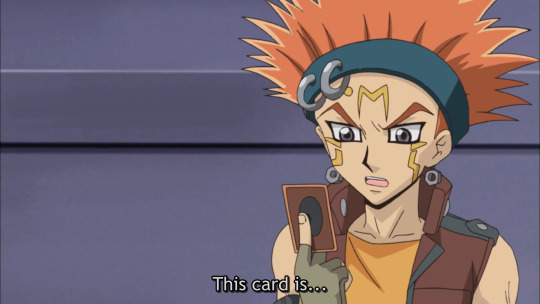
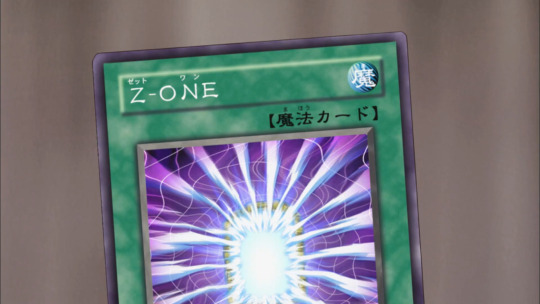
(I'd like to point out that the dialogue following this moment doesn't make it clear whether Crow even knows what Sherry's connection to this card is. For all we know, this could be the first time Crow sees it, without being aware of any of the context surrounding it.)
You know, the card that's essentially a symbol of Sherry's attachment to her parents and her commitment to revenge. The card that basically her entire character revolves around. For a single piece of cardboard, this thing comes with a lot of narrative baggage attached, yet canon doesn't even take the time to assure us that Crow knows what Z-ONE means, other than it being a memento of Sherry's parents, as Mizoguchi explains. And frankly, this all feels like a rather ham-fisted attempt to get some last-minute setup for the later confrontation between Crow and Sherry in. It's like the writers desperately wanted to feel the emotional moment in the duel later to feel earned; they wanted to have their cake and eat it, too. There's only one problem: They didn't even bake the damned thing, the ingredients are just sitting around, untouched, as if staring at them long enough will magically make a cake manifest.
But, well, since I'm already talking about this, I may as well get into the actual meat of the matter, because frankly, it's not like Crow gets much else to do at the start of the arc. Yusei takes off because he at first wants to go to the Ark Cradle alone (like an idiot), leading to the signers coming after him (and telling him he's an idiot). Joining this effort and assuring Yusei that they won't let him die alongside the others is as much as Crow gets to do before the inevitable three-way duel starts.
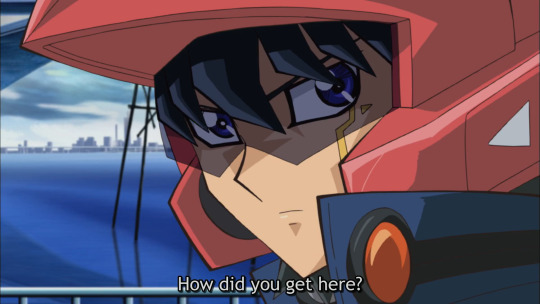
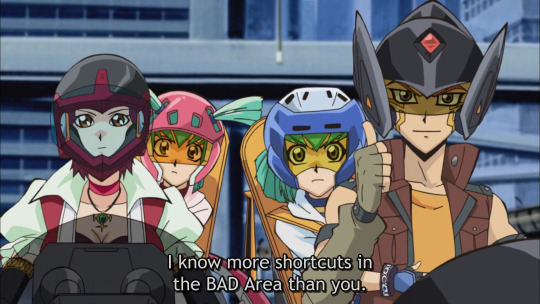
(That said, while it doesn't accomplish anything, I've always appreciated this little moment while Yusei still tries to pull his stupid kamikaze plan—Crow would know more shortcuts in the BAD area than he does. After all, he lived there for a good while!)
After that, everyone gets up to the Ark Cradle and, as we all know, the signer group is forcibly split up by Z-ONE before deciding to go to a Yusei gear each in order to shut down Ark Cradle's negative Moment. (Top ten sentences that wouldn't make a lick of sense to anyone who isn't up to their neck in 5Ds lore.) And the very first duel on the menu in this final stretch of episodes is also Crow's final duel in the entire show.
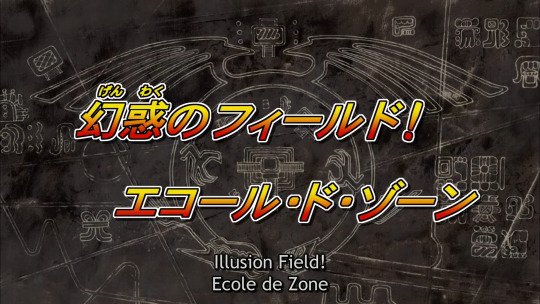
(Drumroll please.)
Here's the thing. I love this duel, actually. I get extremely hyped every time I rewatch it. BUT. But. I do not love it so blindly that I couldn't see that it has not one, but several issues. Not only that, but those issues don't just rest on Crow's shoulders, they sadly rest on the shoulders of all three participants in this duel, because frankly? Alongside the four-way Jack/Rua/Ruka/Aporia duel, this duel is one of the Ark Cradle arc's desperate attempts to tie up loose ends. Because as much as I enjoy this arc, that's exactly what it is: A race to the finish line, an attempt to tie as many loose ends as possible up in as little time as the show could get away with. To make clear why I think this, let me just list off all the things this arc resolves or at the very least tries to tie up with a neat bow:
It reintroduces Aki's psychic powers, which we were previously led to believe she'd lost. Notably, we didn't get a reason for why they disappeared and don't get a reason for why they reappear, either. It also turns them into healing powers in an attempt to establish a reason for why she later studies medicine.
It explains what happened to Sherry and what actually drives her revenge. Furthermore, it releases her from her narrative fridge-prison in order to actually let her duel Aki (yes, Aki, specifically), which is a confrontation that was subtextually implied several times previously.
It resolves the question of Bruno's identity by revealing him as an antagonist.
It finally reveals Life Stream Dragon, who was at this point teased over seventy episodes ago.
It also finally rewards Rua, who was teased to possibly become a signer during the DS arc, with an actual signer mark. (As short-lived as it may be.)
It actually explains Iliaster's real plan, which is Z-ONE's hope that the 5Ds gang can actually save the future.
Speaking of which, it actually explains who Z-ONE is and why he's a big deal. (Remember, this guy was first teased a good while ago at this point in time.)
Alongside Sherry, it dusts off several protagonists who didn't get an opportunity to duel on-screen and lets them duel one, final time. (Notably, Aki, Rua, and Ruka, who at this point haven't been seen duelling since the early WRGP or even pre-WRGP.)
You may notice that none of these bullet points contain Crow. They do, however, contain Aki and Sherry, both of whom went into this finale with several unanswered questions as to their characters. Crow, not so much. But let's just put a pin in that for now while we actually jump into the duel.
*Cracks knuckles* Aki & Crow VS Sherry. Here we go at last. Fair warning, the character writing of all three participants of this duel overlaps a fair bit here, so expect to hear a bit of a mishmash about our revenge trio.
So, how does this duel start? Firstly, with Sherry waxing poetic about why she's even opposing Team 5Ds now.
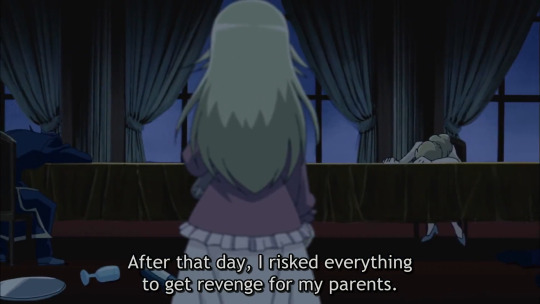
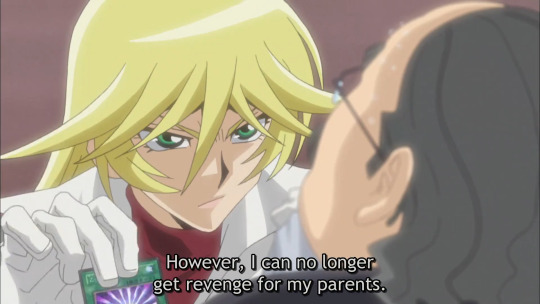
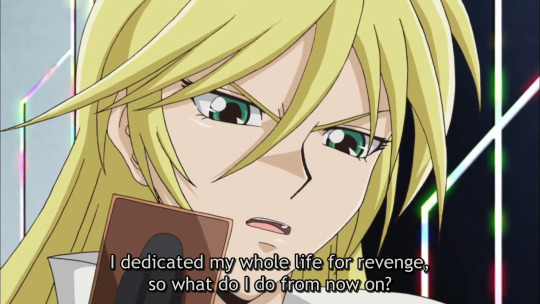
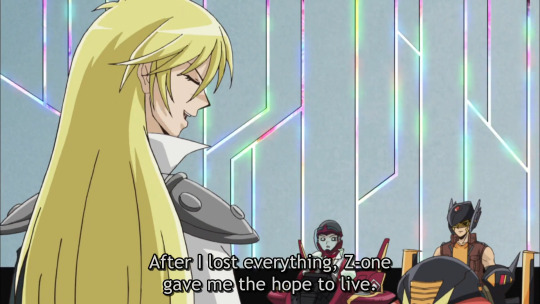
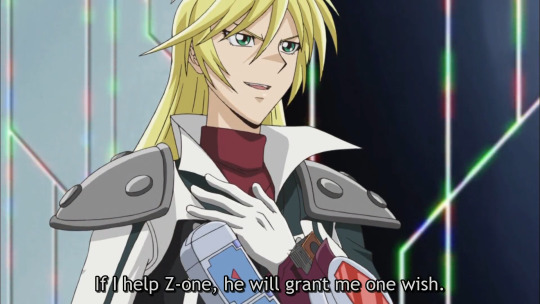
(A dramatic switch of sides that sadly doesn't hold a candle to Bruno turning out to be Antinomy. Which, funnily enough, might be why this duel is front-loaded and Bruno's comes later.)
I won't dig into this too much, but I just want to point out the one thing this moment gives us: It establishes character motivation. Sherry claims she can no longer get revenge and has thus lost her purpose. (The reason why she can no longer get revenge, if you're interested, is because Moment Express, her final lead, vanished in its entirety, as far as canon is concerned.) Thus, she took the bait when Z-ONE offered her a new purpose, and, more importantly, a reward. Now, Aki and Crow at this point in the episode don't get to hear what that reward is, but for our analysis, it's important to keep in mind: Z-ONE promised Sherry he'd alter the timeline so she would get her parents back if she helps him. And I think this is immensely important because this is not only Sherry's goal in the present, I think it's actually the core of her character from the very first moment we meet her. In classic, tragic-avenging-type character fashion, she claims to want revenge when what she's really doing is trying to numb the pain of the awareness that she'll never get her parents back. (Though I'll admit this may also be my generous read of her as a person who likes revenge-obsessed characters.) And then, Z-ONE dangles the actual thing she wanted all along before her. Of course she took the bait.
This brings us to the start of the duel itself. As we know, Sherry employs some tactics that feel quite different from what she previously did in this duel. First and foremost, she messes with the mechanics of the duel itself by using the field spell Ecole de Zone, creating an illusion that confuses Aki and Crow into duelling not her, but each other at first. Sherry, meanwhile, takes a very passive role, clearly intent on letting the two destroy each other while she sporadically activates card effects to accelerate this. What makes all this stand out as even more unusual for her is that she sets this up by lying. At the beginning of the duel, she tells Aki and Crow that there's two of her, and that each duellist will fight one copy of her on a seperate field each, but this is a misdirection to make the two signers duel each other instead of her. And, look. I don't need to tell you this is out of character for Sherry. Canon literally does that for me.
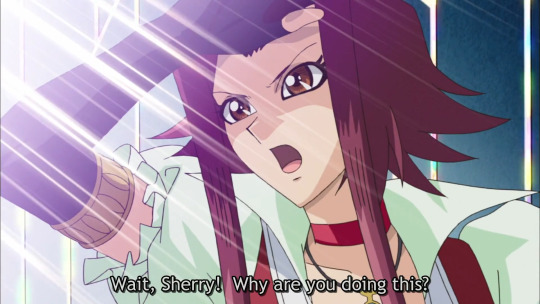
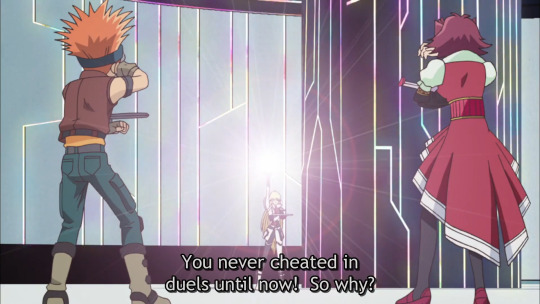
(Case in point.)
It's only after Crow and Aki catch onto the fact that something's wrong and after Aki destroys the field spell that Sherry uses her "real strategy", switching to Soul Binding Gate, which inflicts real damage every time a monster with less attack points than her life points is summoned, in order to whittle away at both other duellists' life points. This is also the point where she reveals to her opponents that she's doing all this to get her parents back. While she does that, we get a bit more back and forth in terms of cardplay, until Aki sets the field up just right so Crow can land a very high-damage hit with Black-Winged Dragon to end the duel. And that is pretty much the gist of it on the duelling side of things.
So what's going on on the narrative side of things, then? Well. Let me front-load something I've noticed on the narrative end: This duel heavily interacts with Crow's and Sherry's characterisation, but barely at all with Aki's. I'll make clear what I mean by that below. For now, let's just get an overview by going through the character moments as they occur in the duel. Why go through all of them? Because most either interact with Crow in some way, or set up a later interaction in the same duel that he's a part of, that's why. I'll get into the nitty-gritty of what this duel did well and what it didn't after that. (Mostly. You may have noticed I like tangents and rambling excessively.)
So.
The first moment belongs to Aki and Crow in equal measure, and happens just as Ecole de Zone is destroyed—which Aki accomplishes by using Crow's monster to synchro summon Black Rose Dragon, as well as prevent that synchro summon from being negated through the same monster's effect, so she can use her dragon's field wipe to get rid of Sherry's field spell. When Sherry is surprised by this, Aki and Crow explain that they memorised each other's cards as part of a strategic effort as a WRGP team.
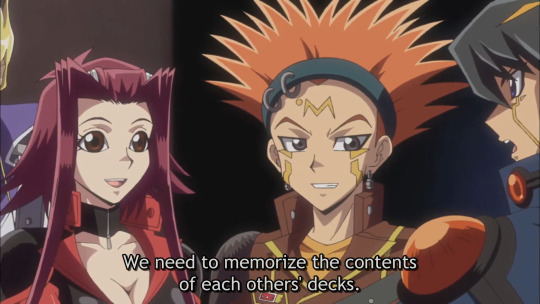
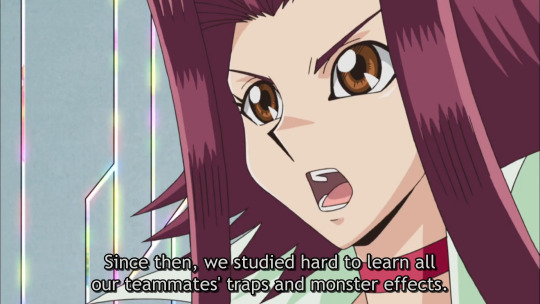
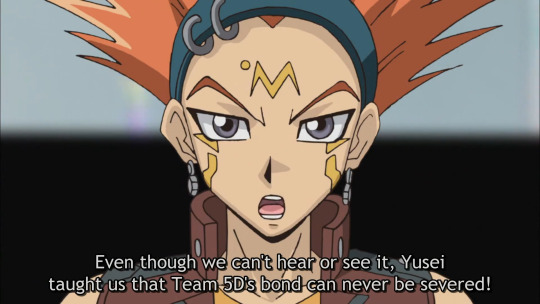
(Friendship is, in fact, magic.)
Not only does this explanation make perfect sense, it's also an excellent little tidbit to tie Aki and Crow together as a tag-team here, as it strengthens the connection between them. The only gripe I could possibly see with this is that it feels like this didn't necessarily need to be a surprise, end-of-the-show reveal. Frankly, it could have been pretty cool to see this much earlier, to have members of Team 5Ds realise what their teammates were getting up to during the WRGP duels, for example. (Instead of so often having the other signers react just as shocked as the announcer to their teammates' plays—I'm side-eyeing the infamous "a trap from the graveyard"-moment in particular. Like, Aki, sweetie, if you memorised Crow's deck, why are you surprised that he has a trap he can activate from the graveyard? I digress.) Moreover, this could have built anticipation for this particular duel, as viewers would have been excited to see what Aki and Crow would come up with to defeat Sherry as a team. So this moment is not bad, really. Just a bit underutilised, at least to me. (The word "underutilised" might become a trend in this post.)
Every other character-driven moment from here on out is shoved into the second duel episode, 140. Speaking of which, this episode starts with Aki and Crow getting the reveal of why Sherry is helping Z-ONE, where she admits that she joined the bad guys because she wants her parents back. She even goes as far as stating that because Z-ONE showed her the future, she has no hope that it can be saved and thus at least wants her lovely past back so she can have some solace before everything goes to hell for humanity. But we already went over that above.
Next up, albeit this moment should probably be considered more of a running theme than just one self-contained thing, we have Crow's struggle with Soul Binding Gate. Remember, the effect of this field spell causes all players to take damage every time a monster with less ATK than Sherry's LP is summoned. And at this point in the duel, Aki is barely above 1000 life points, so Crow worries about triggering the field spell's effect and hurting her, which leads to him playing suboptimally because he's more concerned about his friend than about winning the duel. Notably, Aki calls him out on this.
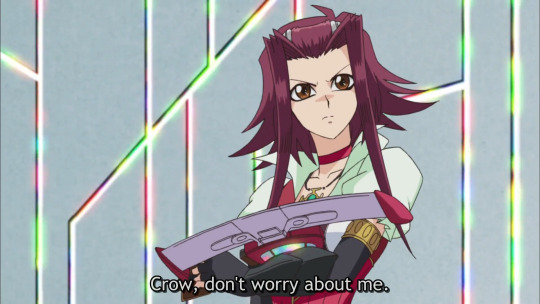
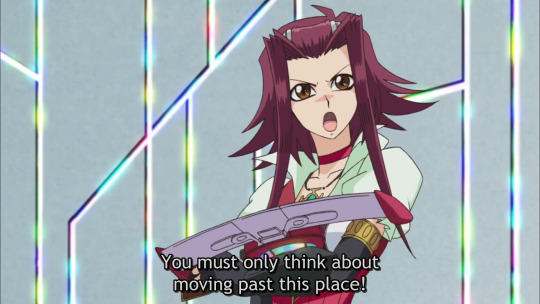
(She has a point.)
Outside of providing an internal conflict for Crow to grapple with, this isn't much to write home about. (Side note: I do find it interesting that they introduce the fear of physically hurting someone in a duel specifically in connection to Aki here, though, given that through her psychic powers, she had to grapple with this exact issue many times in the past. I have no idea if this was intentional, though.)
Between this and the next moment, there's a nice bit of interplay between Crow and Aki again, where he activates a card to refill her life points just in time so she doesn't drop to zero through Soul Binding Gate, while Aki uses a defensive trap to protect Crow in return.
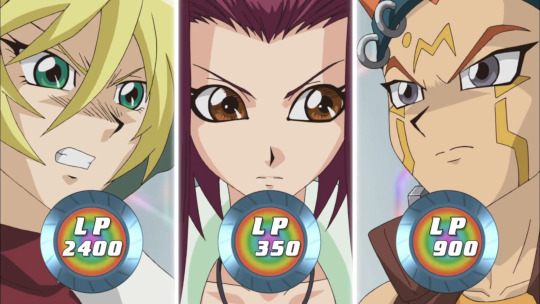
(This is just here because it's a money shot to me. The juxtaposition of their faces and their life points, showing that while Aki may have the lowest life points, she still has the coolest head in this duel, and while Sherry technically has the upper hand, she's beginning to falter because she didn't anticipate the other two to work so well together. It's chef's kiss. Mwah.)
What follows after this, is, of course, the Big Moment. Where Sherry tries to convince Crow to forfeit so she can win and have Z-ONE change the past. And this is the one I really need to dig into.
With Sherry's earlier admission that she's on Iliaster's side because she wants her parents back acting as setup, she begins her attempt to sway Crow by telling him that if he had the opportunity to change the past, he would do it, too. And while Crow initially protests, Sherry challenges this, then proceeds to show him what Z-ONE's power could accomplish, and we get a lengthy sequence where Sherry, through weird cyborg-techno-magic-shenanigans that are never explained, takes Aki and Crow to a dreamlike space where Crow sees the orphans he used to take care of being happily reunited with their parents. Sherry also ominously tells him that this is "what he desires deep in his psyche" before promising him that if he surrenders the duel, Z-ONE can give him a world where Zero Reverse never occurred and all the kids can have happy lives with their real families. (I wanted to post most of this sequence in screenshots, but while I have them, I've realised I'm only a few images short of tumblr's limit already, so forgive me because I will need those remaining image spots.) This moment proceeds to introduce some serious doubt on Crow's end. Aki, meanwhile, remains steadfast, telling him not to fall for Sherry's manipulation, which leads to her giving an almost Yusei-style speech. In a moment where Crow wavers, both because he's genuinely considering whether taking Sherry's offer might be the wiser choice, and because he doesn't want to hurt Aki by triggering Sherry's field spell effect, Aki calls out to him and tells him to snap out of it by reminding him of how Yusei reached out to her during their second duel. This speech is a bit, um. Clunky, I feel. (At least if the translation is correct. If it isn't, then that may be the issue.) See, she tells him that Yusei "saved her from the darkness of her psychic powers", that "he wasn't concerned about his own safety and risked his life to persuade her", that, because her psychic powers are now gone, she's "renewed" and that this somehow brought her to the epiphany that as long as she believes in her own potential, she can change the future. This is lifted almost verbatim from the scene, by the way. Leaving aside the fact that half of this feels like a mild to severe misrepresentation of Aki's character arc during the DS arc (don't talk about it, don't talk about it, I need to make this another post of its own, damn it), I, personally, can't exactly follow how she ended up with that final epiphany from the circumstances she listed. But lucky for us, Crow apparently gets what she's driving at, because he quickly echoes her statement and they both conclude that Crow's kids also believe in the future and fight to live, that they're not sad about their lives the way they are right now, even though they don't have parents. Thus, Crow catches himself, echoing Aki's sentiment and telling Sherry that he, too, believes in the future. And through the power of Friendship and Believing in the Future, he manages to use Aki's cards to land the final hit, nicely mirroring how she used his to destroy Ecole de Zone.
...Phew. Okay, look. First off, that above, large section is basically several character beats stacked on top of one another. On Sherry's end, we have the intriguing fact that she's specifically trying to manipulate Crow, not Aki. In fact, she doesn't so much as try to sway Aki, as though she knows it's no use. Then, on Aki's end, we've got her pulling a real Yusei, staying level-headed almost the entire duel and reaching out to make sure Crow stays on track. This moment also ties back to her own conflict with her powers again. (Which, unfortunately, I will talk about, and yes, I'll be chewing drywall the entire time I do it.) Finally, on Crow's end, we've got a nice, proper moment where he doubts himself and, by his own admission, nearly makes a terrible mistake because he wants nothing more than for the kids he used to take care of to have good lives.
Now, before I go over what worked about this moment and what didn't, let me just chew through the rest of the actual duel itself, too, then circle back too highlight some things. In other words, time for me to chew some drywall.
*Sigh*
At the very end of the duel, there are two more character moments that are noteworthy.
First, right before the final hit, we get Sherry desperately defending herself against Aki and Crow's newly strengthened belief that the future can, in fact, still be saved, which she does by (rather heartbreakingly) asking what's so wrong about wanting her parents back, about wanting their love and warmth back. It's at this point that Crow's allowed to get back at Sherry by challenging her beliefs, telling her that people "work hard to live because they only get one chance at life", and that there's no point in trying to go back to do things differently, that the only way to keep going is to believe in the future, regardless of whatever painful and sad events one has had to live through. I'd say this sentiment certainly fits Crow, character-wise, especially given his rough Satellite background. It does partially fall flat because it feels a bit weird for him, specifically, to now be acting like he knows Sherry inside and out, much like she did with him earlier, but again, this is simply a matter of setup and I'll try not to belabour that point again. The horse is already dead, no sense in beating it. It's after this speech and the final attack that Sherry finally realises her error.
Buuut this leads us right into the next character moment. Because as the duel ends, Sould Binding Gate physically falls apart, pelting all three of our duel participants in debris and threatening to crush them under it. While everyone does briefly fall over (and Sherry gets a moment to realise that her father wanted her to live strong, not accept seemingly inevitable doom and die weak), they soon realise they were not, in fact, buried under rubble, though. Because guess what! Black Rose Dragon to the rescue. Black Rose Dragon, who can suddenly physically affect her surroundings again. You know, that thing we were led to believe Aki could no longer make her monsters do because she lost her powers completely out of nowhere. And there's more! Because not only does Black Rose Dragon take care of the debris for the trio, as she disappears, she also heals all three of them, and in response, Crow gets a line that I unfortunately cannot for the life of me discuss without bias because it kills me every time.
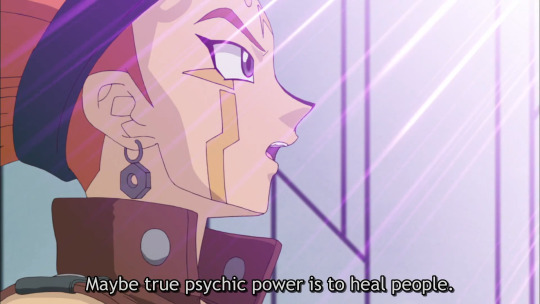
(Crow. Crow, please. You're killing me. I beg you.)
This line out of Crow's mouth feels extremely weird to me, and in the process of typing up this post, I've been trying to find the reason why. Here's the conclusion I've come to: Firstly, it feels a bit out of place from him, somehow. A line hypothesising about what psychic powers can or can't do—this is something I would have expected out of Aki's mouth, but not out of Crow's. I believe what makes it feel so out of place, though, isn't necessarily that it seems a bit odd for him, specifically, to theorise about this, but that when I hear it, I don't feel like the character is saying it. Instead, in this moment, moreso than in some others that suffer from the same issue, I hear not Crow, but the writers speaking. I hear them telling me "look, we know we made it seem like Aki's powers are super gone and like they were super, irredeemably bad, and like she and you should be happy that they're gone, but here, see, this is what they're really like. Don't you think we came up with something clever here, to set her becoming a doctor later up nicely? No, this isn't because we needed to backpedal on our decision to make her lose them and be happy about it at the last second, why do you ask?". And yes, I concede this might just be me. (So feel free to disregard this in terms of analysis, I just have some weird kind of vendetta against this line.) But still, even without my personal issues hampering me, this line of dialogue out of Crow's mouth is just plain odd. After all, how would he know what "real" psychic powers are? Since when is he the expert, especially considering we've never so much as seen him comment on Aki's powers before? (And for the record, this line would have seemed just as weird had any other character other than Aki said it imo. It just has that unmistakable "writers trying to justify something at the last second"-tang to me.)
And do not. Do Not get me started on the fact that the writers, despite going to such great pains to paint Aki's psychic powers as an exclusively negative thing especially during the WRGP arc, decide to reintroduce them here, suddenly as a good thing that can also heal people, which directly contradicts every choice they've made when it came to Aki's relationship to her powers ever since the Team Catastrophe duel. While crucially also lacking the one thing this entire duel is practically begging for: Fucking. Setup. But at this point, the handling of Aki's powers, specifically, really needs its own post, so I'll hold off on any further comments here and come back to that another time. I feel like I'm beginning to talk in circles, anyhow. Setup. Setup, setup, setup. This duel wishes it had it, because then the ideas presented here—which, in a vacuum, are compelling—might have worked smoothly.
But, with that. We have finally made it through the duel itself. Sherry, at the very end, gets her change of heart and at last cements herself as a good guy, and that concludes the first duel in the finale, and also both Aki and Crow's last duel in the entire show.
And good lord, was this duel all over the place. Though I think my meandering scene-by-scene breakdown of it showed as much. Now, onto the proper evaluation of what worked and what didn't here. First, let's get the good these two episodes do out of the way, shall we. (Because there is a lot of Bad I need to yell about, unfortunately.)
By virtue of being one of the final duels, this is Aki and Crow's last chance to shine, and shine, they do. Both in the duelling department and in the character department. Aki makes two major plays that upend Sherry's strategy and Crow's perfectly in sync with her, showing that the two truly are teammates, and paying off all the character moments they had specifically in the Team Unicorn to Team Catastrophe section of the WRGP. Their friendship and cooperation is believable and entertaining to watch. Then on the character side, Aki's growth is (somewhat) paid off—where she used to be a character that doubted herself and was afraid of hurting people, she is now the one who can keep a level head and help others fight their self-doubt. Meanwhile, Crow gets to show off his unfailing dedication to community and family again, both by watching out for Aki and by selflessly desiring not for himself to have a better life, but for the kids he used to take care of. And Sherry, who was previously removed from the narrative in such an unsatisfactory way, finally gets to duel again, gets to explain why she actually does what she does, and gets to join the heroes at the end, permanently joining the ranks of the good guys instead of the villains. Happy endings all around.
Ehem. And this is where I'm gonna be less nice about this duel. Because the problem is, due to the specific constellation of characters involved in this duel and how they previously interacted in the show, there's a lot of stuff here that doesn't work nearly as well on a second watch as a first watch would like to make you believe.
First, a broader issue on the card game end of things: The way this duel feels, it's very much more Aki's duel than Crow's, which is also kind of confirmed in the card plays being made. Though it's Crow who's first shown to catch onto the fact that a third party is activating additional card effects out of nowhere, it's Aki who fully solves the mystery, uses Crow's monster to synchro summon Black Rose Dragon, then activates her dragon's effect to get rid of the illusion for good. And while Crow gets to land the final hit, it's Aki's setup and her trap, Synchro Stream, that make it possible for him to win for both of them. And yet. On the dialogue- and character-interaction side of things, this duel is made out to be much more Crow's than Aki's. Because, perhaps surprisingly to some, Aki doesn't waver one bit in this duel. She's got her head in the game the entire time. She's here to do business—that business being defeating Sherry—and by god, does she do it. Moreover, unlike Crow, she has much, much better setup to be duelling Sherry than he does. And this comes right back around to the main thing this duel suffers from, which I've already harped on about: Crow and Sherry, up until this point, have not interacted in a way that would make the connection between them seem in any way significant. Unfortunately for this duel, though, Aki and Sherry have.
From the first episode where we're introduced to Sherry, she's shown to be interested in who Aki is and what she can do. During the duel between her and Yusei, she comments on Aki's powers. Later, when Aki is getting her turbo duelling license, Sherry watches on with interest. At some point while Aki's training, Sherry drops by to speak with her and Yusei again. My point here being, of course, that Aki, unlike Crow, got several scenes where she interacted with Sherry or had Sherry meaningfully take note of her existence before this point. Yet, whatever dynamic the writers may or may not have been aiming for between these two is, at best, underutilised in the final duel, if not completely ignored, at worst. Instead, the writers shift their focus to Crow and try to make us believe that Sherry, a character who has barely acknowledged his existence thus far, would know him well enough to consider him the better target for her attempt at manipulation. (And don't get me started on how the hell Z-ONE's weird robot magic is supposed to expose what Crow "desires deep in his psyche". That is simply a chasm the show expects us to suspend our disbelief over.) And look. The thing is, I don't think the Big Moment where Sherry tries to convince Crow to forfeit is terrible in isolation. Like, they could have made this work, had they given these two setup, had they given us, the audience, reason to believe Crow could be swayed like this (which they, notably, also didn't), and had they given us the impression that Sherry knows Crow well enough to pull something like this. What hurts the scene immensely, however, is that it's preceded by everything before, starting from the WRGP, where there is no setup between these two, no reason to believe Crow could be convinced to forfeit a duel against a major antagonist, and no meaningful interactions to support the belief that Sherry knows who Crow really is at all.
What also stands out to me is that Crow really doesn't feel like the best character to parallel Sherry, here, either. Parallel in the sense that she tries to get to him by expressing a desire she believes they both feel—getting a certain, nicer version of the past they never had back. Because the thing is, Sherry and Crow hardly feel like they have very much in common, and there's certainly no previous hints to make anyone believe they would have this in common. (So for all we know, Sherry could have just been taking a shot in the dark by trying to convince Crow.) You know who could have made for an excellent character to mirror Sherry, though? Yeah. The third person in the room during this scene. Aki.
See, here's the thing about these three as characters, in relation to what this scene tries to accomplish (getting a protagonist to waver by having the antagonist appeal to certain emotional similarities between them): While Crow may perhaps be more relatable to the audience, he isn't all that relatable to Sherry. He comes from dirt poor origins, she from rich ones. He doesn't even remember his parents, she defines herself by the memory of hers. She's a lone wolf, he's incredibly community-focussed. The only parallel you could have drawn between these two, up until this duel, is knowing what it feels like to want revenge. (Sherry with her parents, Crow with his kids back in the DS arc.) But guess what, unfortunately, Aki knows that too, what with her past as the Black Rose Witch and wanting to make people pay for ostracising her. And to make matters worse, she has a lot of other things going for her that parallel Sherry much, much better, too. They both come from well-off families, both have had major, traumatising events in their lives revolve around their parents, both left their initial family structure by way of drastic changes in their life, both are intimately familiar with the desire for vengeance, and, most damningly, Aki knows what it's like to stand on the side of the bad guys—like Sherry is doing in that very scene—because you feel like it's the only place that gives you hope/meaning. Not to speak of the fact that Aki, given her turbulent past with her psychic powers, would probably know exactly what it feels like to want a past you never had back. There would have been so much to work with there, and it makes whatever they were gunning for with Crow look... lacklustre, to put it mildly, by comparison.
The worst part is, I think, that the blame lies neither with the characters nor with the scene concept here. Solely with the execution. Because I truly think they could have made this work. They could have made the entire duel work, big character moments and all. But the keyword is and always has been setup. Setup, which the writers, at least in part, strangely gave to Aki, but not to Crow, which is what hurts particularly his portion of this duel, and, arguably, his character writing in general. Because—and this may be a small thing in the grand scheme of things, but permit me this—while Crow wanting a better future for the kids he used to take care of over a better future for himself feels perfectly on brand, the idea of him forfeiting a duel against a major antagonist, while the threat of the entire city being destroyed is hanging above his head... doesn't. Like, yes, I've talked about the fact that Crow is the only character in 5Ds who ever actually loses duels on purpose. What you may remember, though, is that both occasions we've seen him do this—against Lyndon and Yaeger, respectively—were much lower-stakes duels than this. Not to speak of the fact that it also feels a little odd that Crow, of all people, would buy into the idea that Z-ONE's genuinely powerful enough to just give those kids their parents back, given how liberally he called bullshit on pretty much any and all supernatural mumbo-jumbo claiming that fate is inevitable, or that the gods have this-and-that power, or what have you the entire show. (Also, doesn't he strike you as the guy who'd wonder why Z-ONE's not using his fancy powers for better things, if the extent of them is so great? Or is that just me?) It's a moment of character doubt that tries to sell itself as believable, even though we've never been given any hints that this kind of temptation, specifically, could work on Crow.
Ultimately, Crow & Aki VS Sherry feels like a very hot-and-cold duel. On the cardplay side, the teamwork between Aki and Crow is well done, yet the duel does feel like it skews more towards Aki than towards Crow. Sherry, meanwhile, plays tricky and mean like a proper antagonist, but does so at the expense of sacrificing all her previous tactics and monsters (and, arguably, some of her character, though this is probably on purpose, given her transformation into an antagonist). Then, on the character side, we've got Aki in an interestingly Yusei-ish role, which, while it feels like a good way to show how she's matured and learned, wastes her character dynamic with Sherry. On the other side, Crow and Sherry interact in several personal ways throughout the duel that leave you wondering when exactly these two got to know each other so well, because the show certainly didn't give us a visible progression of their dynamic. The only dynamic that leaves nothing to be desired is that between Aki and Crow (stilted speeches aside), because it excellently showcases their friendship and teamwork. Very weird decisions made in the writing here all around.
We'll get into the nitty-gritty of what changes I would have suggested to improve this duel below, but first: What happens after this duel? Well, two more Yusei gear duels, Aporia briefly standing up to Z-ONE, and then, the final, big clash between Yusei and Z-ONE.
Given that Crow isn't even present for two of these duels and then barely gets more to do than stand on the side and react during the final two, I will dare to skip all that, though. Because really, Crow's occasional comments and the play-by-play he sometimes joins the others in giving when spectating a duel don't exactly contribute anything to his character. They're just there so he gets something to do and doesn't fade into the background entirely when a duel that doesn't involve him is going on. This includes the moment where he, much like the other signers, gets to give Yusei Black-Winged Dragon for the final duel, as well as the later moment when Yusei uses it, chanting in tandem with Crow as BWD arrives. And other than that and the tear-jerking moment when he later reacts to Yusei returning despite all odds, he really doesn't get any noteworthy scenes.
In other words, we are skipping straight to the end. So, where do we find Crow there?
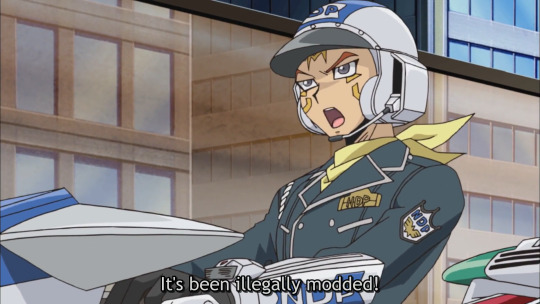
(Oh, y i k e s.)
There's a popular post circulating around this site that goes something like "the worst thing you can do to a character is make them a cop during a timeskip". And, look. I don't think I need to tell anyone that becoming a sector security officer is an extremely jarring character choice for Crow. Crow, of all people! The guy with the face full of markers, who used to be part of a duel gang, who was introduced in the show gleefully stealing from security Robin Hood-style, and who has every reason to despise law enforcement! (Leaving aside the obvious logistical issue that Crow in no country in the world could have completed his police training in the few months between the Ark Cradle debacle and this scene. But given that 5Ds generously brushes realistic concerns like this one aside on multiple occasions, this is, funnily enough, the thing I'm also more willing to overlook here. The character dissonance, however, less so.)
I'll try to be generous and guess that the writers were aiming to convey a message somewhere along the lines of "even someone who's done bad things in the past can become an example for others" or something like it. The problem is just that Crow didn't need any such message because he was already the good guy while he was still actively stealing from security. He was the lovable rogue to a T, damn it! But this, in particular, is a surface scratch hinting at a bigger issue, I think—namely, the issue of the show's complete pivot when it came to the depiction of law enforcement after the DS arc. Because when we think back to that part of 5Ds, good security officers were the exception, rather than the rule. And this is exactly what makes Crow of all characters becoming one even weirder. He would know, would remember how security used to treat him, his kids, his friends, his brothers. And if the idea here was that, well, he's trying to improve sector security by joining it and changing it from the inside, so to speak, then guess what was missing again: Our good, old friend setup. I'm starting to feel like a broken record. So yeah, I don't think a ton of people, whether they like or hate Crow, would disagree that this is a supremely weird position to put his character in.
As we find out through 5Ds' epilogue, however, his sector security job isn't quite what Crow actually wants, though. (And thank god, because that would have been such a bizarre position to leave him in.) Instead, we're shown fairly quickly that several duelling leagues are apparently trying to scout Crow out, and that he's tempted to accept one of the offers and go into pro duelling. This is at first shown in a short scene where something like a league scout follows Crow, then later, when the whole group—sans Jack, at first—is getting together and everyone starts discussing their futures. Aside from complaining a bit about his job and upsetting Aki without meaning to, Crow doesn't get much to do here, either. For what it's worth, at least him feeling tempted to ditch the security job feels more in line with the original Crow we got than with whatever strange twist the writers were going for after this shorter timeskip.
What follows is the very last duel of the show, the long-awaited Yusei VS Jack rematch, of course. And while he doesn't get to participate in this one, Crow, much like Aki and the twins, spectates the duel and ends up having an epiphany about what he wants to do. This epiphany ends up being that he does want to turn to pro duelling, and as a reasoning, canon provides us with this:
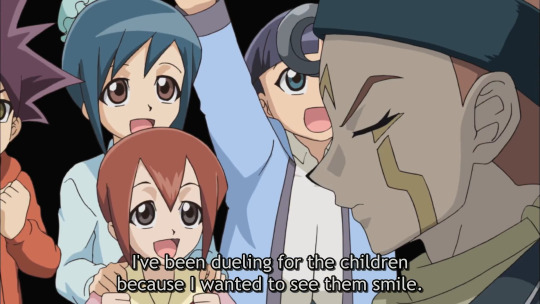
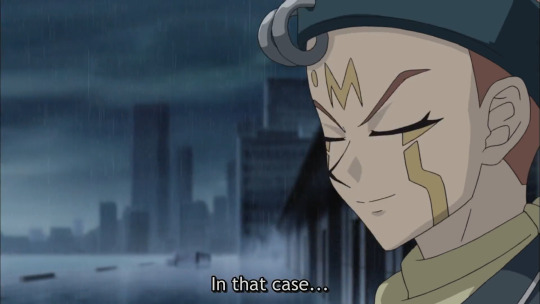
(As is known, intense card games are the only way to make children smile.)
Personally, I wouldn't say this is a terrible or out of character reason for Crow to decide to go pro. But there's more to that I'd like to discuss. First, though, let's take a quick look at where we find Crow after the second, bigger timeskip, which is inserted right in the middle of Yusei and Jack's final duel.
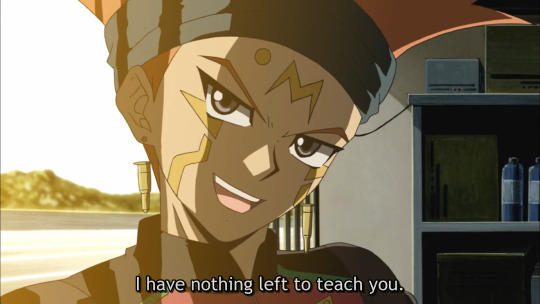
(Okay, yeah, I'm a sucker for the bullet earrings.)
The quick scene Crow gets here makes it unmistakably clear that he did go into pro duelling, just like he decided during the duel in the past, and not only that, he went into tag-team duelling and apparently managed to reach world champion status with his teammates. The above scene, however, is the exact same moment he decides to leave said team, so he can instead go solo and (presumably) try to beat Jack.
Now, we can discuss this in a bit more detail. Personally, I'm extremely in two minds about Crow being one of three characters, total, who ends up becoming a pro duellist after canon. Jack seems obvious, especially given the pivot back to his more Fortune Cup-esque persona the writers did around the Red Nova episodes. Rua also makes sense, given that Jack was his idol from the start. Crow, though, feels a little more complicated. The thing is, like so many things surrounding Crow in the Ark Cradle arc, the writers gave us no indication pro duelling is something he's really passionate about before this point. Worse, they didn't even really tell us what reason he saw to participate in the WRGP with his brothers beyond "could be fun". So there isn't really a connection here. The same thing goes for the fact that he specifically talks about teaching his teammates above, which is also something he wasn't associated with all that much previously. Though this one is admittedly less egregious, because at least Crow was seen briefly coaching Aki as she prepared to take his spot during the Unicorn duel. Still, while I wouldn't go as far as saying it's an out of character choice for Crow to go pro, it still feels a little odd that he went down the same route as Jack. Personally speaking, it feels like the writers didn't quite know what to do with him. Because as I said, Jack is obvious and Rua also makes sense, and I'd say the same goes for Yusei. Then there's Ruka, who is treated about as in-depth in the epilogue as she was throughout canon, and Aki, whose "setup" for her timeskip self was done extremely hasty and last-minute, but at least it was there. Between all of them, Crow occupies a weird spot where it doesn't so much feel like he ended up on the wrong trajectory for his life, as it simply feels like there were choices the writers could have made that would have fit him much better. What with his theme of legacy and community, trying to make Pearson's dream of a place where disenfranchised children can learn good life skills a reality would have been a good fit, for example. Especially considering his close ties to the Satellite orphans he used to take care of, which, funnily enough, are reinforced one more time as canon flips back to present day and Crow is seen bidding his kids goodbye.
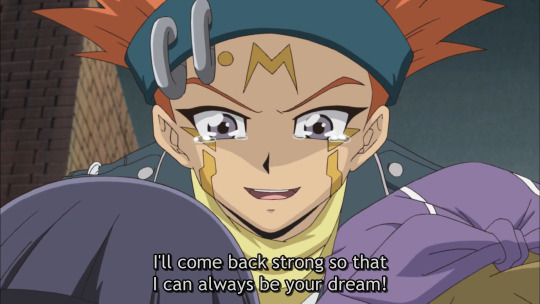
("Come back"? When, precisely? And what part about "literally saved the world twice" doesn't qualify you as a hero to a bunch of kids ten times over already?)
Considering canon seems hellbent on making sure we know the signers went their separate ways and that they aren't anywhere near each other by the very end of the show, though, my guess is that Crow had to end up doing something like pro duelling, in order to get him out of New Domino City and away from the friend group whose shenanigans we were so accustomed to following by that point. Of course, there's also the argument to be made that Crow staying in NDC and getting a more community-focussed ending would have also been significantly less cool than making him a kickass pro duellist with bullet earrings, which circles back to how the writing interacts with its target audience.
The only thing that follows after this, then, is the big goodbye, and with that, ladies, gentlemen, and other lovely 5ds nerds, we have successfully followed bird boy's path throughout the entire show. And what a ride it was. (I did not think this analysis would end up stretching over a whole four posts.) Time for some closing thoughts before I do my thing and suggest some rewrites that could have made all this feel more coherent one more time.
Crow's character arc, if it can even be called that, feels about as hot and cold as his and Aki's final duel with Sherry over the course of the show. His introduction is fast-paced, he's made to be likable quickly, and his integration into the main protagonist group is as quick as everything else about his narrative. Between the way he shows up out of nowhere, briefly disappears without fanfare, and is then reintroduced with even more importance before slipping into the signer group like he's always been there, it truly feels like his entire inclusion in the narrative was a last-minute decision by the writers to include that one, additional character concept Kazuki Takahashi had originally created after all. If there was one way to describe his whole arc, it would be that it's a rush. At the start, the writers are in a hurry to make him likable, then they're in a hurry to make him a signer, then they're in a hurry to give us a whole backstory for him, then they're in a hurry to give him a believable character dynamic with Aki, and at the end, they're in a hurry to pay off a character dynamic with Sherry they didn't properly set up with him. You may notice that leaves significant gaps, and the lack of balance between those gaps and the rushes surrounding them, I believe, are part of why he's such a polarising character.
Crow is integrated so thoroughly into the signer group at the end of the DS arc that, much like Aki and the twins, he gets stuck in the position of being a character that cannot simply be removed from the narrative for a longer amount of time. And this, I think, ends up biting him in the ass, because in the gaps where the writers don't rush to do something big with him, it often feels like they don't quite know what to do with him at all. So, he instead gets relegated to small side tasks, like inane duels that don't affect the plot, or becomes the person who reacts to unfolding situations in whatever manner wouldn't fit Yusei or Jack. He feels like he's the third portion of the protagonist trifecta only in theory—the status of an equal third player seems to be what the writers had in mind, yet, looking at the show, it feels like an honorary title, at best, because the writing choices made for him don't convey anywhere near the same amount of thought and effort as those of Yusei and Jack. Crow's backstory doesn't intersect significantly with that of his brothers, his dragon is introduced way too late and never given an upgrade, he never gets to clash with Iliaster until the Team New World duel, and throughout the entire WRGP and Ark Cradle arc, there isn't a single duelling victory that's solely his. People who prefer other characters over Crow like to harp on about how much screentime he gets; I argue that this is exactly what showcases how poorly the writers took care of him in many instances. For as much as Crow is plastered onto the screen and given the aesthetics of an equal player in a protagonist trio, his many appearances are as much of a curse as they are a gift, because too many of them aren't spent setting up anything meaningful or developing his character in any way. Speaking of character development: There is none. Crow exits the show pretty much exactly the same as he entered it, brief security stint aside. And, look, this need not necesarily be a bad thing. Static characters exist and they have their place in stories. It's just that in Crow's case, his utter lack of development feels like another damning indicator of the writers' cluelessness when it came to utilising him, given his weird, sort-of-elevated-protagonist. Aki, who is so often weighed against him, gets significantly more development than he does. And though Jack also ends up in almost the same place at the end of the show as he was at the start, at least he had a dip in the middle where his character was somewhat malleable and not set in stone. Crow didn't.
What we end up with, then, is a character whose concept is perfectly fine on paper, but whose execution proceeded to turn him into the one and only favourite for some, and the embodiment of piss poor writing for others. Having now looked at pretty much his entire run in the show with a bloody microscope, I end up somewhere in the middle, myself. He's a good character and much of his writing is confusing at best, utter dogshit at worst. As for what decisions in the writing room led to him turning out like this, I'd still pay good money to know them. For what it's worth, I've tried my very best to make an educated guess as to all of them.
And now, for the final time, allow me to do my very best to suggest how the issues of the Ark Cradle arc could have been addressed in order to make Crow's part in it less messy.
In previous posts, I've split up my rewrite suggestions depending on one circumstance: Whether or not Crow stays a signer. However, this time, I will deliberately forgo this, for one, very simple reason—Crow's status as a signer doesn't matter one bit for the Ark Cradle arc. Regardless of whether he has a mark or not, his duel with Sherry remains unaffected, and so does his later timeskip-self. Thus, pick your favourite, both versions work for the Ark Cradle.
Now. Onto the elephant vengeful Frenchwoman in the room. Let me repeat my favourite word in this post one more time. What the dynamic between Crow and Sherry needed, more than anything else, in order to satisfyingly be paid off during their Ark Cradle duel, was setup. There was so much time Crow spent on screen doing fuck all, and some of that time could have so easily been allocated to him interacting with Sherry in a meaningful manner. (I'm side-eyeing especially his pre-WRGP duels. Those did nothing to add to his character and could have easily been replaced with episodes where he actually gets to talk to Sherry one on one.) And if not that, then the writers could at least have done themselves the favour of letting Aki talk to Crow about Sherry, which would have arguably set up their three-way clash even better. Moreover, show us how the hell these two characters parallel each other and how they differ, damn it! The main issue with the big moment Sherry and Crow had in the duel was that Crow's faltering and his sudden, deep understanding of Sherry came completely out of nowhere. So what if they had shown some of that earlier, then? What if they had shown where the lmits of Crow's resolve lie, what could get him to doubt himself? What if they had drawn the parallel of Sherry and Crow both supposedly being characters that sometimes wistfully think about a past they never had earlier? It would have done so much to make that duel hit exactly the way it was probably meant to. As a bonus, if we had gotten Aki and Crow talking about Sherry, too, the scene of talking Sherry out of helping Z-ONE could have been a team effort, just like their card playing was. Both of them would have reasons to know different aspects of Sherry each, and both could have brought up good arguments. And this is really all this duel woild have needed to be better on the story end, I think: A solid, narrative foundation to make it obvious to us why it has to be these three characters duelling, why it could have only been this setup, why it made the most sense to let these three bounce off each other. Crow only needs that extra step to slot in better with the girls here.
As for the epilogue, I don't think anyone will be surprised to read that I would have never made Crow a cop, not even temporarily. The depiction of law enforcement 5Ds gives us during the DS arc is too damning for that. However, given the way the ending is structured, he does need some sort of occupation that feels like it's not quite the right thing so he can later change his mind about it, of course. Here, though, is where I, purely in service of Crow's character, would suggest a change that probably doesn't work with the ending's final aim of separating the 5Ds gang by hundreds of kilometres each. I would let Crow go into pro duelling first, then let him figure out that's not what he actually wanted. Crow, to me, is a character who is so intrinsically tied to community and family that turning him into a solitary pro duellist—even if he claims to do it to make the kids back home smile—feels off to me. Thus, from a character standpoint, I would let him pivot back to wanting to take care of those kids. Either through what I suggested above, letting him carry on Pearson's dream, or, which also feels fitting to me, by letting him help out Martha again and setting him up as the guy who'll take over when she can no longer run the orphanage. It's not the cool, glamorous end the show gave him, but it's what feels more like the family-focussed guy we first met in the show. It doesn't gel with the idea of permanently separating him from the other signers, though, unfortunately. To do something like that while keeping his community theme, one would probably have to send him away to shack up with Brave or something, to help orphans in other countries. But this, I think, nicely showcases the dissonance between what Crow's character writing would suggest he might do at the end, and what the show demanded he needed to do so he'd no longer be close to the others. Because my focus, as always, is only on character here. And Crow, with his personality and his writing, feels like the character who chafes the most against the idea of striking out solo, abandoning his ties to the community he was so invested in previously. To that extent, the above suggestion is the best I can provide with what we were canonically given. If we wanted to keep the canon ending he gets and actually make it make sense why he suddenly wants to be a lone wolf pro, the only thing I could suggest would be more setup for that. (Ah, there it is again. One final time.) Show Crow having some actual competitive drive, show him enjoying the whole tournament thing more than he thought he would during the WRGP. Just give us something that shows why he would want to go down this path, and why some other things that were previously important to him might not be a priority anymore. It all comes back to setup.
*Deep breath*
So, here we are, then, and this is it. This is all I could make of Crow's character writing in the entire show. To everyone who read this post in its entirety, a heartfelt thank you. To everyone who read the whole series of posts in its entirety, I'm so glad you're as insane about this show as I am, it makes me feel incredibly appreciated. Hope you enjoyed the ride, more meta posts will come eventually, just about different topics. In the meantime, see ya.
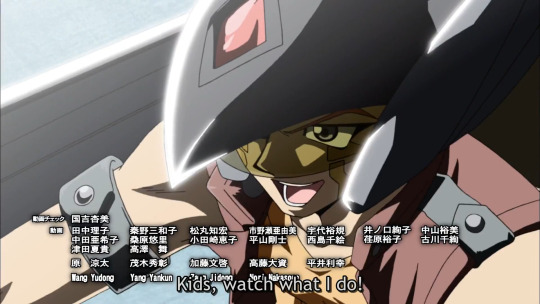
#yugioh 5ds#crow hogan#ygo 5ds#5ds#sherry leblanc#yugioh meta#IT IS DONE#HOLY SHIT IT IS DONE#I can't believe I've reached the point of my life where I do gratuitous media analysis for fun#this was such a ride god damn#but I completed it!!!!!!!!!!!!!!!!!!!!!!!!!!#I'm sticking a gold star on my forehead as a reward#anyway hope you enjoy this last part#feel free to yell at me (enthusiastically) about it#orchid rambles
41 notes
·
View notes
Note
hey hi hey! do you perhaps have cniki/ceret/cwilbur hcs? any of them r fine and if you dont thats okay bye!!!
I don't have much c!niki knowledge I'm afraid however I will give what little hcs I have (also credit to my buddy @cinn-namon for half of these Eret HCs, if you want more feel free to mug him /hj)
Wilbur
- Prone to singing or humming whenever given the chance, when there's an audience he puts So Much Effort into it but he'll do it when he's alone aswell
- Her first instinct in most situations is to laugh, she doesn't mean to but it just sorta slips out regardless of the circumstances
- By far my wildest Wilbur hc: Wilbur is a nature spirit- my basis for this is mostly Greek mythology. In Greek mythology it's common for the children of gods and immortals to be some sort of nymph or dryad (basically a nature spirit) and the concept of nature spirits is a really vast one that can range from "pretty lady found in Trees" (Dryad) or "Unidentified mystical energy" for my HCs I tend to use more of the ladder. So Wilbur is a physical manifestation of the wilds, basically a shapeshifter but add a connection to the world itself. In theory he has no "true" form but the form he took when he was born was just a straight up fox (later learned how to shift into a more humanoid form as he grew)
- More thoughts on nature spirit Wilbur ahead: how she appears and how well she can hold her form is entirely dependent on her current state, because of this she changed a lot between L'manburg and Pogtopia :3 When she first came to the SMP she looked almost entirely human, save for a few "off" traits (strange eyes, fangs, slightly pointed ears, ect.) but when Pogtopia hit she changed rather suddenly, becoming more like Fundy in appearance. Ghostbur was just a straight up spectral fox, and post revival Wilbur always has a few fox-like traits showing that she can't seem to get rid of
- All of their mannerisms are slightly off- they don't quite emote "right". When they're fully human they come off as oddly animalistic, when they're more animal-like they're weirdly human. They tried to play themselves off as at least Mostly human for awhile but gave up pretty quickly
- Has no fucking clue what his species is because of the samsung smart fridge nonsense- honestly he just assumes that he was Born Weird. When asked he's always weirdly cryptic about it
- God awful cook, y'know those posts about people fucking up their food in unbelievable ways? That's Wilbur. Do not let her into the kitchen she will burn water
- Disaster bi, seemingly most attracted to people who are either actively against her or have done shitty things to her in the past and she Cannot be normal about it (See: all of the shit said about Schlatt, Eret, Quackity, the list goes on)
- Touchy but only when they're in a good mood. L'manburg era they'd always be putting an an arm around someone's shoulder or ruffling people's hair, small acts of physical affection, but any other time they've actively shied away from touch unless it's initiated by them. This is mostly because they're easily overstimulated by touch (despite being incredibly touch starved post revival)
Eret
- Wither hybrid, they can shift to hide some of their wither parts. When they were apart of L'manburg they also played themselves off as human
- Loves to bake and stress bakes when especially stressed out- I like to think her and Niki would often bake together
- Looking directly into his eyes activates a person's flight or fight response, which is why so many people have gotten Jumpscared by his eyes in the past
- Probably has one of the best fashion senses in the entire SMP and yet only really dresses up whenever someone is coming over (90% of the time she just lounges about in comfy clothes, we love a comfy queen)
- His memory is absolutely god awful so he's prone to writing things down or- more often- taking photos. A lot of the pictures from early L'manburg were taken by him
- The L'manburg uniforms were made with Tommy and Eret's combined efforts (Wilbur supervised and occasionally stabbed himself trying to help <3)
- Sews all of their own clothes, they'd love to sew for someone else but they haven't gotten the chance to outside of the uniforms (if they did they'd probably make an entire wardrobe though)
- She's the one that taught Tommy to sew :3
Niki
- Catgirl c!niki supremacy
- She likes churus (the cat treat) and will eat them like gogurt
- Being as close to Wilbur as she was she's absolutely heard way too much about all of Wilbur's awful crushes on their enemies (she can never look at Eret the same way again)
- She has autistic girl swagger idk what it is but she just does. Has the most unsettling stare known to man (by complete accident)
- Despite being a cat hybrid she enjoys playing around in local bodies of water, big fan of stomping around in rivers
#romeos ramblings#c!wilbur#c!eret#c!niki#dsmp headcanon#so sorry for the long ass post i'm so full of thoughts#and doubly sorry for the wait! i was a bit busy yesterday#this isn't even the full extent of my cwil headcanons i have so many#i could write essays about nature spirit wilbur the concept is so fun to me#all c!niki hcs are based on vibes i'm so sorry i need to Investigate her character more
20 notes
·
View notes
Text
Hold it, hold it- HOLD ON.
So SaiScribbles is bringing to light the fact that, on top of everything else alleged about her, Lily's most popular video has a lot of pieces ripped from two articles written by Jaimie Kingston (WuhWack, need link) and Riley H (Medium) complaining about SU's racial problems.
Other than being a bit on that 2016-2019"your fav thing is bad and you should feel bad"-spectrum of criticism that would later fuel our dumb anti v proship discourse we have today, I think the arguments made by Jaimie and Riley against SU are solid. Sai and her commenters are kind of otherwise treating the criticisms themselves like they're the problem and that they ought to be 'debunked'.
As I've stated a few times now, I'm a fan of Steven Universe and even I don't think they handled all the discussions of race and conflicts well. I like the Diamonds as villains and liked them being 'redeemed' -yes, SU truthers, I too have read Rebecca's explanation and how Steven doesn't really forgive the Diamonds. I know that's the intent, mine and other people's counter is that wasn't very well communicated or done particularly well, and yeah no matter how you spin it or put it in the context of fiction; the Diamonds were interspace war and overlords and the series and Steven himself made peace with them- Also, I thought the Garnet anti-racism psa was kind of in bad taste and talking-down to it's audience.
As far as complaints I'm not able to speak for because I'm white as fucc: if Sugalite's design, the human zoo plot, the way the crewniverse drew lips and people of color (AS people of color themselves) is uncomfortable or offensive to you- you're within your right to be offended about it and dislike Steven Universe on that basis. Don't let anyone tell you otherwise. Just because an LGBTQ or BIPOC person had a hand in making something does not mean it can't still be offensive: Velma, The Nutshack, Hazbin Hotel and Netflix's Good Times, though shows for adults, were written with/by/for bipoc folks-- that DOES NOT mean there aren't any problems with those series. I can personally think SU beats all those shows into the ground but that doesn't mean it can't be racist just cuz I don't want it to be.
I kinda feel like Sai is missing some of the point of the og articles, dunking on them for ever making these complaints and being upset, when the real focus should be on how Lily pulled an honest to god James Somerton.
What Lily did with Jaimie Kingston and Riley's is proof of her greatest flaw as a critic and activist: she uses (or 'steals') other people's criticisms to fuel her own hatred of something. Moreover, she phrases these criticisms made about the thing she hates as being an inherent moral failing on people who defend it and so her takes are the correct way to feel and think. That was not the point of either article, regardless of how I think they were written. These articles were written as a potential call-out at worst*, Lily's vid was a straight up attack on the Steven Universe fanbase as a whole.
Lily can try to say otherwise, but what she's really angry about is that Steven Universe wasn't written exactly like how she wanted and she's pissy because the fanbase was and is still really toxic. Both these reasons are valid enough to be all 'ick, I hate SU and I hate how god damn in love the fans are with every aspect of it'. You can fill up an entire video with just rants about the fanbase and the writing quality. If you don't know how/don't CARE TO articulate, add upon, link, or source another perspective that's not your own, DON'T TOUCH UPON THOSE TOPICS.
This is why I otherwise leave out the criticisms to be had against Star vs the Forces of Evil's diversity activism fails. I have 'thoughts' on it, as a white fan watching a show by a white creator about a white girl trying to be an ally, but my point in omitting them from this discussion is not to say these problems aren't there and worth talking about. I don't have faith in my own social awareness to talk about these issues I don't have a perspective on. I can talk of them, but not about them.
Even if Lily is native, which she could be (not what this post is about), she is not black. She sat here talking for black people using black people's words as if they were her own -> blocked these writers for stealing from her. And then she[Lily] went and made a couple dozen Nazi-references to the whole issue of genocide in the show -> when Jewish fans and listeners told Lily to maybe not do that (especially cuz Rebecca Sugar is Jewish), Lily dismissed, blasted or blocked them outright.
Lily only cares about social justice when she can use it to benefit herself and her own selfish ideas, feelings and wants.
Allies (of any kind, speaking for a group they aren't a part of) may be misinformed, apologetic, ignorant, rude or abrasive in how they go about their activism. There's no exact right way to do any of this. But, there is always a wrong way.
#su critical#su criticism#steven universe critical#lily orchard critical#saiscribbles#steven universe
22 notes
·
View notes
Note
To bring this chain of asks full circle, what are your top ten favorite Delicious in Dungeon/Dungeon Meshi monsters and why? Either on the basis of biology, design, or even story significance? What are your favorite dishes from Delicious in Dungeon? 😋


I thin the chapter that introduced Dungeon Meshi's take on living armor is the moment where most readers realize they're in for something special and more than just the gag manga it could have been. For me, it's the epitome of what makes Dungeon Meshi's world-building so special. Living Armors are a stock monster in fantasy fiction, and normally the thought that goes into them begins and ends with "a suit of armor moves on its own because magic." That's all they have to be for an audience to accept them and move on, and in most fiction, that's all they will be.
Dungeon Meshi, by contrast, came up with the most creative explanation for why a suit of armor would walk around and attack people I've ever encountered. It's so bizarre that it's fascinating on its own - BUT THEN, just to show she's a fucking master of story-telling, Ryoko Kui makes the process of our hero discovering the nature of living armor vital to stopping them, saving his friends, and making his way through the dungeon. Dungeon Meshi took a monster archetype that is usually little more than a footnote and turned it into a crucial and iconic story beat, one so important that it continues to figure in to the plot thereafter in the form of Laios's living sword, Kensuke.

Griffins are a monster I have a great deal of fondness for, and one I feel should be more prominent given how iconic they are. There should be more kickass griffins in fiction, more memorable griffin stories, more griffins in general! Dungeon Meshi didn't reinvent the wheel with its take on griffins like it did with Living Armors, but its griffin/hippogriff arc is nonetheless one of the most important emotional beats in the story, and also led into the changeling arc, which is one of the funniest in the entire manga. They also gave griffins the gravitas as a monster that they rightfully deserve. A+ griffin use.

The vegetable lamb is one of my favorite obscure medieval folklore monsters and seeing it show up in this manga made me so happy. It is exactly the kind of bonkers idea that fits perfectly into Ryoko Kui's fantasy world, perfect addition, no notes.

I'm of two minds on how Quetzalcoatl has been reduced to a monster in pop culture instead of, you know, the benevolent god he was originally, but Dungeon Meshi's coatl at least gets a lot of gravitas and even plays a semi-heroic role in some scenes, which is better than most knockoff Q's get. Also the one in the manga itself is covered in psychedlic flower pictures because of SPOILERS and it's really cute.

...Falin's chimera form is ridiculously hot in ways that make me look long and hard at myself in the mirror and wonder why I'm wired like this.

On a less existential side of things, Laios's Ultimate Monster design is, for my money, the absolute best running gag in the manga, with the PERFECT punchline at the story's climax that you'll think you've guessed but trust me, you haven't quite. If you're looking at it and thinking, "That looks like what a four year old would draw when making a monster," you are right, and that is the gag, and trust me, it is ALWAYS funny when it pops up.
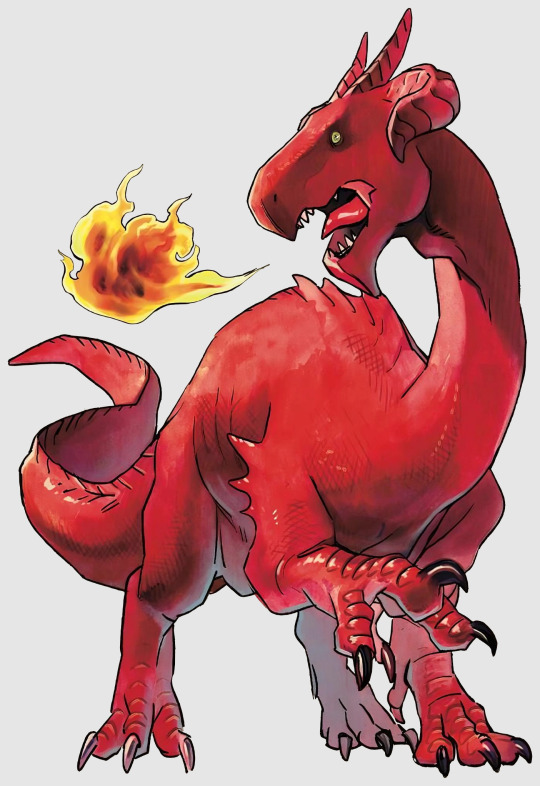


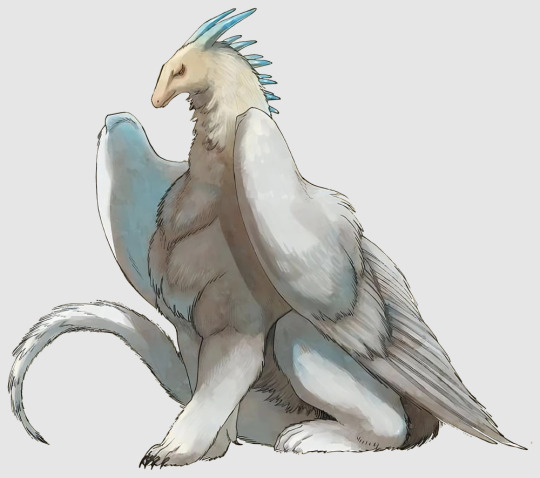


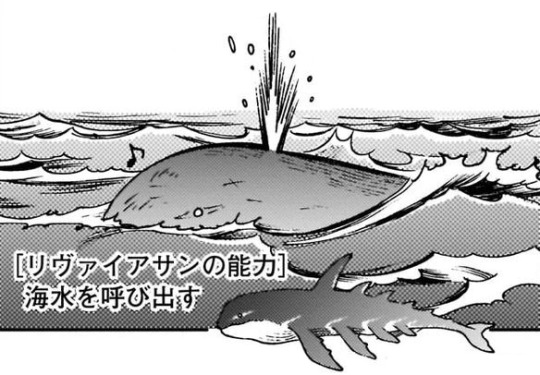
How many slots do I have left? Four? Fuck it, let's talk about the dragons, we can go over I don't give a shit. The Red Dragon is the Heavy for the first third of the manga, and it's built up impressively throughout all the monster-eating shenanigans, so that when it finally arrives as this small-scale kaiju who makes the dungeon tremble and quake in its path, you really get a sense of dread attached to it. A lot of modern fantasy fiction gets lazy with dragons, content to let their cultural reputation do the work for them, but Kui made sure that when a dragon entered her story, it feels like an EVENT.
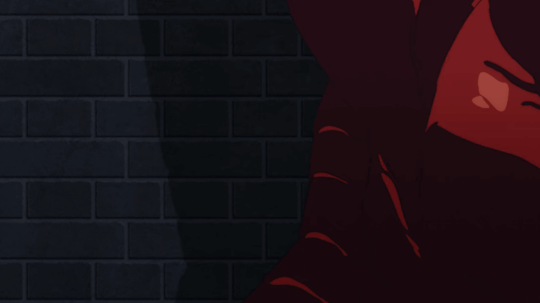
I haven't watched the anime yet, but what I've seen shows they did a good job handling Kui's design, which has this wonderful blend of T.rex, sauropod, and crocodile to give it this primordial reptilian strength. I also love how they animated its Thor Thimble, it's a great touch.
About the only thing I'd change about the Red Dragon is its lack of wings, but then you see how the other dragon species look in Dungeon Meshi, and it makes more sense. Another trope of modern dragons I dislike is giving them all one body plan, when their mythic predecessors could have all sorts of arrangements and numbers of limbs. Kui's dragons follow suit - the red dragon is a stocky quadruped, green dragons have the hexapodal look with two wings and slightly more gracile proportions, we've got two-legged and two-winged wyverns, two-armed wyrms, multi-finned leviathans, Asian-style dragons, and even a big fluffy arctic dragon for those freaks out there who don't want dragons to have scales for some inexplicable reason. All of them are still very much dragons, but each one feels unique and broadens what a "dragon" can be in the setting. It's great, I love it, A+ dragon usage.

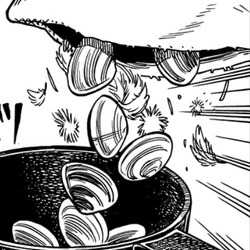
Oh, yeah, there's one other dragon species I forgot to put up there - the Nightmares, which in your dreams look like, well, a nightmare, and in the waking world look like... shellfish. Apparently it's a Japanese pun that doesn't translate easily into English. They're not really my favorite monster but I knew if I included all the other dragons and not these guys then at least one person would feel compelled to "Um, actually" me. That nightmare form for the Nightmare looks pretty wicked, though.
51 notes
·
View notes
Note
Part of me thinks that under WarnerMedia while My Adventures with Superman got greenlit in 2021, some of these decisions could either feel self-insert like with Mindy Kaling’s Velma or a mandated checkbox fulfillment to suit corporate desires. It can explain why they wanted Lois Lane to be a more prominent character to fit current narratives and trends. I’m all in for well written characters, but it needs to be done in a way where it makes sense. Here’s too hope James Gunn handles her well with the same craft as with Richard Donner and Bruce Timm’s iterations.
so I heavily disagree with this and I'm spider-sensing some uncomfortable dogwhistles here. What do Kaling's Velma and MAWS even have in common? MAWS' marketing didn't push a titular celebrity to the extent Velma did. Any reason you've decided to compare two shows on the basis that both have prominent women of color in the lead? Velma's an adult comedy mystery while MAWS is an action adventure with a heavy focus on romance (it may be on Adult Swim, but it was never intended for an adult audience. That was corporate shenanigans). Saying they're catching some sort of trend to follow Velma is pretty ignorant of how difficult it is to pitch an action animated kids show with a woman in the lead. Entirely different markets and genres. And from what I've heard, the MAWS crew mention they had surprisingly little executive restraints which allowed them to go out of the box with their takes.
Also Lois being prominent or the lead of a Superman adaptation is not new or a trend. "Lois & Clark", "Superman & Lois", even one off animated movies like Reign of Supermen had Lois as the POV lead or heavily involved. She has led many comics on her own. I don't love this insinuation that her being racebent is a "trend"- especially when the MAWS crew mention American Alien as their source of reference for their version of Lois and Jimmy.
"I'm all for well written characters, but it needs to be done in a way where it makes sense". I don't know what you mean by this. 1. there are no well written characters in the entirety of MAWS, and 2. What needs justifying to you? Aren't well written characters self justified by being well written? Is there something about a WOC in the lead that is threatening your suspension of disbelief? Because boy have I heard that tons of times before.
I get that film and tv adaptation heavily influences popular perception of a character, but why do we place our hopes on these white guys to do justice on a character like Lois of all people. This dismisses the many women and other talented creatives who got to work on Lois in the comics. Like why zero in on MAWS Lois being a "self insert"? I don't like to auteur-ify a collaborative medium like an animated series, but MAWS was pitched by Jake Wyatt. He's the showrunner. Lois is Asian in his pitch packet. How is that a self insert? If anything, I wish an Asian creative put more of their life experiences onto Lois because then she wouldn't feel like someone so interchangeable with a white woman. And misogynisticly written.
Just kind of weird to ask this to us, the chindo authors who made a fancomic about Lois being chindo, informed by our lived experiences as chindos. That's arguably as self insert as it gets. While I'm interested in James Gunn's take on the Superman mythos, I'm not getting my hopes up on a pre-dominantly white cast and no current narrative emphasis on committing to Superman as an immigrant. Also I didn't suffer through Guardians 2's take on Mantis just to hold this white guy up as the pinnacle on writing women.
#askjesncin#“Lois feels like a self insert!” girl please I wish she WAS a self insert then I'd have a smidge of some authenticity to latch onto#I could write a whole post later about how “self insert” while has some valid criticisms is often rooted in misogyny#Paul Dini made a whole book about how he projects himself onto Bats and we're not accusing him of “self insert”#jesncin talks maws
20 notes
·
View notes
Text
Earlier today I came across a tiktok of a queer cis woman responding to a transphobic and interphobic asshole. I'm debating whether or not I should link the tiktok in a reblog- I think it would help illustrate my point, but I'm also not trying to put her specifically on blast, this is about a dynamic I see all over.
The guy was doing a lot of the standard "everyone's cool with LGB people, but why are you associating with trans or intersex people, this is just making you look bad" concern trolling. The response tiktok was clearly meant for a general (us american and british, given the specific context) audience and has a lot of the pitfalls you would expect. Like, it was a mistake to teach cis people the idea that "sex and gender are two separate things" because they then can use that to further enshrine sex as simple and unchangeable, you all have seen the posts talking about this dynamic, that's unfortunately totally expected for this kind of video by cis queers for a presumed cishet auduence, this is not a novel observation I'm making.
But something else grabbed my attention also, especially in light of that other post that's been going around on here about appeals to tradition in the lesbian community. When this guy was making the case that cis LGBs and trans people have totally different struggles and are just entirely different from one another, and so shouldn't be grouped together, her only response was to point to history. You see, many of the people at Stonewall were black trans women, and Marsha P Johnson and Sylvia Rivera were instrumental in the early usamerican queer liberation movement, and trans people have always been here. All of that is true, of course, if a bit revisionist about how accepted trans people were in those communities.
But that was the entire argument she had for trans inclusion- trans people were there and are therefore grandfathered in, which is very much the standard script cis people follow for answering this question. The thing that struck me and motivated me to make this post is how it feels like cis LGBs can get by without understanding the basis of their own oppression. It feels like usamerican conservatives handwringing about gay people "destroying the nuclear family" should have given the game away for the actual anxieties underlying homophobia in the same way as conservative handwringing about how transition can harm reproductive capacity does for transphobia. The fact that that is the same anxiety, the same desire for control of (social and biological) reproduction, should be the clearest sign that we are (ostensibly) part of the same community not because cis queers feel they should be nice to us, but because we are on some level the same thing in terms of the societal transgression our open and proud existence represents. It's frustrating how often it feels like the best we can expect from cis people, queer or not, is a surface level appeal for diversity and not a deeper understanding of the shared basis of our oppression.
#idk about my wording on the last part#I'm not trying to do a “we're so inherently radical because we're queer” thing#lord knows the usamerican queer community could use a hell of a lot more actual radicalism on many different fronts
18 notes
·
View notes
Text
Several Sentence Sunday

Damn, it's been quiet here today. I'm assuming my American moots might be at Labor Day picnics but international friends, where you at? I'm kicking things off here at almost 7pm on the East Coast.
If you haven't heard, Stripper!Alex is getting a second chapter! I just finished the rough draft so this should be ready soon. Thanks for reading, friends. Below the cut bc it's horny... don't tell me you're surprised.
Tagging @anincompletelist @blueeyedgrlwrites @bitbybitwrites @caterpills @cricketnationrise
Henry finishes his third– no, fourth? Fifth? Margarita of the night and puts the glass down, determined to stop. He doesn’t need to spend his entire day tomorrow in bed. Alex has been looking over at Henry throughout the night, but he hasn’t tried to get him to dance. He does see Henry put his glass down and flop into an armchair, however.
“Hey, baby, you alright?” Alex asks, coming over and brushing Henry’s hair back from his face.
“I’m good,” Henry slurs, gazing up at Alex. In the dim glow of the multicoloured fairy lights June strung up, Alex looks startlingly like he did that first night, in the private room at the club. He’s stunning and Henry can’t stop looking at him.
“You’ve had a few, huh?” Alex laughs. “You should get up and dance with me.” Alex grabs Henry’s hand and pulls.
“No, I couldn’t, Alex.”
“Please?” And oh no, not the puppy dog eyes. Christ. Henry hesitates and Alex lights up. “Come on, it’s easy. I’ll show you.”
He tries to pull Henry to his feet, but he’s too unsteady and he falls right back down.
“I guess I’ll just have to dance with you here,” Alex grins, a wicked glint in his eye. Oh. Oh. Oh no.
He leans over Henry and starts rolling his body and his hips like he does when he’s putting on a show. Nobody is paying them any attention at first, but then Alex starts really getting into it. He turns and pops his arse, then leans back and starts grinding against Henry.
“Alex,” Henry hisses. Someone – Pez, probably – whoops loudly and everyone starts cheering for the show Alex is putting on.
“Alex, no!” June cries out. Henry glances over to see June perched on the far edge of the couch, a hand covering her face. Nora has one arm around June and both eyes on them.
“You know he’s a stripper,” Henry hears someone laugh.
“Knowing it and seeing it are two different things!” June yells back from behind her hand.
Alex just laughs and keeps dancing, pulling out all the stops. Henry feels helpless to stop it and surprisingly unwilling to. It’s not the first time Alex has given him a lap dance at home, but it is the first time they’ve had an audience. Maybe Alex was right and there is an exhibitionist in all of us. As private as Henry normally is, he almost wants to give it right back to Alex with everyone watching (save for June). Nearly everyone here has seen what Alex has, but only Henry gets to have it. To experience it, on a near-nightly basis. The primitive caveman part of Henry’s brain roars victoriously.
Alex’s arse – which is absolutely one of Henry’s favourite things about him – rolls in smooth circles against Henry’s dick, coaxing it to hardness. Henry can’t decide if he wants to put a stop to this or wait and see what Alex does.
@cha-melodius @firenati0n @faketrex @getmehighonmagic @hgejfmw-hgejhsf
@iboatedhere @inexplicablymine @kiwiana-writes @myheartalivewrites @onthewaytosomewhere
@priincebutt @rmd-writes @sparklepocalypse @tailsbeth-writes @thesleepyskipper
@theprinceandagcd @thighzp @wordsofhoneydew and as always, an open tag!
19 notes
·
View notes
Note
Do you think the Owl House writes good romance queer or otherwise?
NO. ABSOLUTELY NOT... but also SLIGHTLY yes.
Like a lot of TOH's writing, its romance writing suffers the same problem: Great concepts and initial presentation but a lack of ideas, focus or proper follow through means that it is kneecapped once the easy, flashy parts of writing the romances is over. The problem is that this is further compounded by the fact that this is EASILY the field in which TOH is the most willing to use cheap tropes so as to allow for simplicity of storytelling which conflicts with the rest of the storytelling. All of this makes the writing of the romances in TOH a PROBLEM.
Let's start, obviously, with Lumity. They are literally a Hallmark couple. That is not exaggeration or a metaphor. One of them is a plucky, small town person who believes in emotions and the present and that all that really matters is that the joy of things is kept alive. Meanwhile, the other is a big city slicker who was raised to care about pathetic things like financial security, her future and making sure that they're still going to have a roof over their head in the future. Over the course of their journey, the city slicker will realize that everything they believed is bullshit, that having ambition is terrible and have pretty much all of their personality traits scrubbed away so they can see things the way the small town person does and then the movie ends.
But... the show didn't end with Lumity getting together and the fact that this was using Hallmark's model gets REALLY obvious. The model requires that the serious one entirely abandon their desire, personalities and commonly their friends and family even, sometimes even their romantic partners. It's an extreme way to show character development and devotion. A show of how much they care for the other lead which is usually meant to be some amount of audience surrogate. That's not good for a character though, as desires/connections often form much of a basis for a character's motivations, and so suddenly the show is scrambling to give Amity a supporting cast to interact with and desires beyond Luz. However, because Luz is her only desire, again following this model, she always abandons those characters and desires to go back to Luz. Luz is still her true core focus in Reaching Out. She doesn't mention Alador in For the Future. This devotion honestly gets so bad over time as to become DISTRESSING because it is not a sign of a healthy relationship. Your partner should not be the only thing you appear to actually care about in this world.
Even if you don't want to accuse them of being a Hallmark model, they aren't anything new and some of their tropes are simply not good. A lot of works will have the quirky, silly guy get with the serious one in the cast. It's a classic pairing but one that's usually handled pretty awkwardly since it usually includes some amount of what comes down to harassment from the quirky member of the cast. Literally sexual harassment if you got with Inuyasha's pairing of Miroku and Sango. This is often because the quirky one sees the other as a challenge or the like and wants bragging points for being able to crack their shell. But of course, TOH would never include something like that. Luz is a good girl and would never declare something like, I dunno, "Maybe I can befriend her like Azura did her rival?"
Yes. That is an actual quote from the show. From Lost in Language where eventually Amity sees Luz's quirky nature as charming rather than trouble and the two finally get cohesion due to Luz's efforts to save Amity's life, which is actually not abnormal for any couple in an adventure show to have be when their attraction starts, let alone this sort of pairing. Again: The show does nothing new here... But why should that matter? I LIKE Hallmark movies after all despite their flaws. They can be fun and charming, even as they make incredibly questionable choices.
Well, part of the problem is that the tone and ego of TOH doesn't match with storytelling that revels in cheats like Hallmark does. Understanding Willow is just one of MANY examples of the show claiming it won't use narrative shortcuts, especially in relationships between people. You know, only a couple episodes before it uses the shortcut from Hallmark of Amity throwing away connections consequence free in Winging it Like Witches. Then, four episodes after that, doing it again in Escaping Expulsion. TOH claims to be more maturely paced than that though. That these are real characters with long term arcs and that they are people, not props. But... The Hallmark model uses mostly pretty cheap props. It needs to for its life as a popcorn movie and for how simple its stories are. Just as an example: Murder might be farther than most antagonists in Hallmark movies but rampant greed and not caring about others to a cartoonish level? Yeah, that's there in those and it's there in Alador and Odalia. These two approaches are simply incompatible and I do not blame anyone, myself included, who thought the show was claiming that there would be more to Amity's character than simple obstructions that had to be moved away and biopsied out of her for the sake of being a love interest.
Now, real quick tangential shout out: My favorite Hallmark style movie, even if it technically isn't one since it's not by Hallmark, is Last Christmas. Yes the one based on the song. It's not perfect but it's a lot more unique in my opinion than most and like... If I can say it still fits the Hallmark style, perfection was already left at the door. Charm and fun though? There in spades.
But, getting back on track, Lumity isn't the only romance in the show.
Raeda, like Lumity, presents a strong, classic romance pairing to begin with as well. The wild outlaw and the more rule abiding loyalist but with the neat twist that age has actually brought them to being much closer in viewpoints. As such, it's more the girl who fits in and so knows how to be a rebel and the nice person who is trying to branch out and push boundaries now. They balance each other well but their conflict is immediately understood. The care is also easy to understand, let alone once you know that the curse and the lies tore them apart.
But... Then S2B begins. Now see, with their backstory, you'd actually expect Raine to have some issues with Eda. Some potential trust problems and the like but... Nope. Their entire being is dedicated to the woman who lied to them and then ran from them rather than being honest with them. Like mentor like student I guess. However, Raine doesn't seem to care. Their relationship is 100% fully mended by the end of Eda's Requiem and everything Raine does, he does for Eda effectively despite there not actually being any reason given by them besides personal desire. Maybe they just don't want Eda possibly dying and abandoning her kids? Don't know because it's entirely left to interpretation.
Worse yet, Them's the Breaks goes even farther and makes it so that Raine is just a clone of Eda. A wild child who wants to break the rules and tell everyone to stuff it. They're just, you know, smarter about it than Eda. Not even that they need a push but just that they're better at hiding it. Neither this nor the devotion makes them interesting and like Amity for Lumity, their character vanishes and the romance at best becomes boring.
And finally Huntlow which... From a romance perspective it's nothing. It's not even to say that it doesn't exist but it's almost literally what a tacked on Romantic D PLOT would be. A couple cute looks, a handful of small exchanges and now they're soulmates. That's really it. Huntlow takes up an exceptionally small amount of time of the story and the time it takes up isn't used serving it explicitly but more to erase any memory of the fact that Hunter is a trained murderer who is VERY willing to execute people who get in his way. Stranger Tides proved that after all.
They're inoffensive but even with that said, they're not good. Hunter loses all of his edge while Willow is so forceful as to almost come across as a bully at times during Sport in a Storm (remember, she literally won't take no for an answer and kidnaps him when he won't listen to her). This does make him look weaker and smaller but it doesn't make either one interesting. In fact, it just reinforces how this isn't a romance built off mutual like and chemistry. It's there because... It's just there. I guess Willow is nice to him once but so is Luz and Amity and he never starts being attracted to them. It's Willow pretty much because she's the one available to date and nothing else.
It's weak and it's nothing I care about, built on two of the most inconsistent characters in the entire show. They're genuinely the easiest for me to imagine genuinely being happy together and being just a nice couple, instead of one being in charge over the other, but that's because they're boring. I imagine Hunter as Ned Flanders as an adult just to drive home the point.
So yeah, I'm confidant to say these aren't good romances. Meanwhile, the characters bend for the sake of the romances instead of the romance being properly based on their dynamics, critical elements to characters are discarded for the ease of them getting together and while we might get some cute moments, they have no depth or oomph to them and are only good when dealing with the wonders of a relationship and not its difficulties which are often the far more compelling parts of a relationship. If you want to know how it handles the difficulties of romance... *stares at how Luz spends the second half of the series lying to her girlfriend despite making a promise to be more open at the end of Falls and Follies* Yeah, it's really fucking shitty. If you compare the conversation Amity and Luz have at the end of Covention compared to their conversation before the Grom Tree in Reaching Out, it becomes REALLY clear just how far both of them have fallen, as well as their chemistry. I have quite literally spent multiple blogs talking about how Reaching Out is the death of Lumity for me, a SUPREME Lumity shipper if the probably close to a million words based on them between original and fan works isn't enough to prove it, and I don't feel like going hard on it here.
But hey, it wasn't ever meant to be a romance. Dana said so herself. It just, you know, takes up literally a third of the show. That's not hyberbole. Amity takes up seven episodes of S1. She takes up six of S2 while Raeda, which ends up being pointless because everything they do doesn't matter, takes up two episodes of S2, and that's if you don't include Falls and Follies as either a Raeda or Lumity episode which it could be claimed for both. Huntlow is a part of Hunter's arc at the expense of having it be TEN EPISODES since he interacted with Luz when Hollow Mind comes up and SHE is the one there for his character's big turn.
For a genre that the show supposedly wasn't about, it sure is prioritized over ANYTHING else. Amity and Luz literally have more plot lines together than Eda and Luz. You know, the two who are pitched as the twin main characters. Mentor and student. The two who will beat Belos together arguably. Yes, King is there but if you think Luz spends too little time with Eda, just imagine what that ends up looking like if you look too closely at Luz and King's time spent together.
And that is an element of romance writing. How does the romance serve the plot and theme. How can you make it important. Amity, Raine and Willow are all non-important to the story, especially when compared to their partners. None of them ever help push the plot forward minus Raine and again, their contribution ends up being pointless. Willow at least arguably enacts some character growth on Hunter but Hunter isn't actually that important to the story, just his relationship with Belos and his backstory. As for Amity? It literally was a meme that nothing important could happen with her around and she has literally no impact on Luz's character ever. If she did, Luz might not have LIED TO HER FOR HALF THE SERIES.
Their contributions to the finale highlight this all too well. They're just effectively background characters. Not even interacting with their partners but just doing what everyone else is doing. Their connections don't matter. Their lessons don't. They don't matter to this story.
Which you know what? Even in a Hallmark movie, the serious lead's turn to becoming bland usually coincides in them, having been persuaded by their love for the quirky other lead, to swoop in and save the day. The effect that love and connection and what not wins out. The relationship is at least part of why there is a happy ending.
When your romance is more pointless, and at best just as charming as, a HALLMARK ROMANCE, I think I can pretty firmly say you aren't good at romance.
======+++++======
I have a public Discord for any and all who want to join!
I also have an Amazon page for all of my original works in various forms of character focused romances from cute, teenage romance to erotica series of my past.
I have an Ao3 for my fanfiction projects as well if that catches your fancy instead.
If you want to hang out with me, I stream from time to time and love to chat with chat.
A Twitter you can follow too
And a Kofi if you like what I do and want to help out with the fact that disability doesn’t pay much.
51 notes
·
View notes
Text
So The Woman Called Fujiko Mine feels like an argument against itself.
I don't mean that in broad metaphorical terms. I mean that this show quite literally looks into the camera and tells you that the very concept behind it is bullshit. It's a grim and gritty re-imagining of Lupin III that seems to regard grim and gritty re-imaginings as little more than contrived nonsense, something hastily slapped onto a perfectly fine piece of media with no regard for what makes that media work in the first place. I don't think I've ever seen a more purposefully self-defeating work of fiction in my life.
What do I mean by this? Well, the basis of this show seems to be explaining the backstory of Fujiko Mine, the Lupin franchise's resident femme fatale cat burglar. What kind of experiences, it asks, would lead someone to sleeping and stealing their way through life? And this being a supposed grim and gritty re-imagining with Naked Titties and Fucking, the answer it comes to is, of course, horrific sexual trauma. The final arc descends into this ludicrously overcomplicated conspiracy involving hallucinogenic drugs, human experimentation, possibly actual magic, all to explain how Fujiko was horribly abused as a child and repressed those awful memories through a life of cheap sex and fancy trinkets. Even the OP screams this point at the start of every episode: "The act of stealing lets her forget everything and keep her memories at a safe distance." She covers herself in jewels and men as if they can hide her shameful, scarred body from the horrors it was forced to endure, a lifetime of cheap thrills to escape the pain of her womanhood.
Except just when you think the whole conspiracy justifying this backstory can't get any more complicated, it overcomplicates itself even further to reveal that none of this actually happened. Turns out, Fujiko's repressed trauma memories were false memories implanted in her when she was already an adult as part of some roundabout cry for help from the actual victim. And in fact, Fujiko was already a sex-loving, treasure-grabbing femme fatale by the time those false memories were put in her. Not because of trauma, but because she just likes having sex and stealing things. And I'm not exaggerating when I say she all but looks the audience in the face and outright says, "See? Isn't it stupid and condescending trying to force a contrived rape narrative onto a female character just because she likes sex? Why can't I just be a bombshell who loves what she does without having to feel ashamed of it? Or does it only count as feminism if characters like me have to suffer for our sexiness?"
It's a genuinely wild subversion that feels a decade ahead of its time. But therein lies the problem: you still have to sit through a mostly straightforward grim and gritty deconstruction to get to the point where it points out how stupid most grim and gritty deconstructions are. And if the point was to criticize those kinds of stories just by being an example of one, well, all I can say is that it succeeded. It absolutely feels at times like a pointlessly dark and edgy paint job slapped on top of a story for the sake of feeling "mature" when all that really means is lots of rape and uncomfortable sexual hangups. Did I mention there's a Class S episode where Fujiko becomes the teacher at an all-girls school and proceeds to have affairs with multiple of her students? Because that happens, and I could feel my skin trying to crawl off my body the entire time.
Like I said in an earlier post, this isn't fanservice in the traditional sense. In fact, with the ending reveal in mind, the presentation and execution is almost maddeningly confrontational, as if daring you not to see it for the cheap shock value it is. You can almost hear Yamamoto and Okada laughing behind the scenes as you scramble to find an explanation for why all this misery porn needed to exist, only for the show itself to say "Actually, yeah, this was all pretty tasteless and crass, who would actually want Fujiko's story to be like this?" But it's still a frustrating fucking show to watch in the moment because all that possibly intentional metafictional subversion just reads as straight-up boring edgy grimdark before you're shown the man behind the curtain. Or, woman behind the curtain. Whatever.
I dunno, I don't think I can give this one a proper score. 5/10, I guess? Ask me in a few months and see if that's changed at all. For now, I'm more than happy to polish off my Yamamoto back catalogue and move onto something else. Which 2013 show will take its place, I wonder?
#anime#tabw#the anime binge watcher#the woman called fujiko mine#lupin the third#lupin III#2012 aniwatch
28 notes
·
View notes